KEO News Wire
Siya turns Madiba’s Midas touch into real gold 30 years later

Siya Kolisi is the Springbok dream the late President Nelson Mandela refused to give up on, but it took 30 years to come to fruition, and fittingly it did so in the city of Love, Paris, writes Mark Keohane.
In Paris, last Saturday night, Springbok rugby’s baton was finally passed, 30 years after Nelson Mandela’s memorable and mighty gesture to wear the Springboks No 6 jersey at the 1995 World Cup final at Ellis Park.
Siya Kolisi, wearing the same No 6 jersey, took Madiba’s baton of reconciliation and confirmed the Springboks as a nation’s sporting love child and not outcast.
Kolisi’s story, in the context of South Africa post-apartheid, is rich, raw and far more personal.
Kolisi’s toughness was born on the streets of Zwide, in the Eastern Cape. Rugby was his escape but it did not mean he initially would board that train of hope.
His mentality was that of any teenager but it needed tough love to put him on that train, and the toughest of love from mentors and coaches to keep him on that train.
Hilton and Kendra Houghton were parents to him when he arrived in Cape Town. They took him in as a son, opened their home to him and gave him a room and initially represented his business interests and gave him comfort and love. They did this when he was 18 years-old and not the revered 34 year-old of today.
Springboks coach Rassie Erasmus, then the Director of Rugby at the Stormers, loved the fight and passion of the young Kolisi and refused to give up on the potential of their rugby partnership, even though other coaches may have ended it before the first whistle.
Kolisi missed his Stormers debut because he had gone out the night before with friends, got into a street fight with gangsters to protect his friends and had been hurt so badly that he could not play the game the next day.
Erasmus was livid that he had gone out, but loved that he had fought to protect his friends.
A father/son relationship revelled in adversity and it was one that would take shape in 2018 when Erasmus, in his first season as Springboks coach, appointed Kolisi as his captain.
If not for Erasmus and his faith and trust in the player, then there is no Siya Kolisi story in 2025
“He’s been on the tough side of being a South African. He knows hunger and he knows poverty. He knows struggle and he knows survival. His story is an inspiration because it speaks to so many young boys and girls in South Africa,” said Erasmus.
Erasmus easily compliments Kolisi but, behind closed doors, he is as comfortable delivering a harder message.
“Siya Kolisi is not bigger than South Africa. South Africa is bigger than Siya Kolisi,” he barked at Kolisi at a team meeting pre the 2023 World Cup quarter-final. His message to Kolisi and the senior players was simple: Shape up or ship out.
“We’ve come a long way as coach and player and as coach and captain. It’s been an incredible journey and I’ve seen his growth as a leader and a human being. He’s done it tough and not without mistakes,” said Erasmus. “He knew his journey could be bigger than him because it could be about the dreams and hopes of so many kids. Now it is.”
Former Springboks coach Heyneke Meyer picked Kolisi for the Springboks, but with Schalk Burger the incumbent, it took Kolisi 14 Tests to get a start.
“He was popular and so eager to learn from the likes of Schalk and Duane Vermeulen, but I knew he would become a Springbok captain and a real statesman.” said Meyer.
Robbie Fleck, when the Stormers coach, selected Kolisi as his captain.
“I love his passion, his rawness and his intent. His teammates responded to his energy and influence and I also rated his game,” said Fleck.
Stormers coach John Dobson was inspired by the subtle nuances of Kolisi’s play and the work that the television cameras don’t follow.
“His second effort in the tackle and at the breakdown is phenomenal. He’s the best there is,” said Dobson.
Stormers centurion and Springbok Scarra Ntubeni is Kolisi’s best friend. They arrived in Cape Town together as 18 year-olds and no one knows Kolisi’s story better than Scarra.
“I’d go to Siya as a friend and tell him I was done with rugby. He’d give me tough love and tell me to quit … and not to come back one day crying that I wasn’t prepared to fight back,” said Ntubeni. “He has had his own struggles off the field and was prepared to own them and fix them. He is a great friend and an inspiration.”
Kolisi, under Erasmus and Jacques Nienaber’s mentorship, has prospered in the national jersey. They have always promoted humility over arrogance and team over individual.
It sits comfortably with Kolisi.
“It is always bigger than one player and the team because the team plays for the country, and that country is every culture and race. We play for South Africa and for South Africans because we are South Africans.”
Kolisi gets symbolism and he lives symbolisms. He has embodied the baton passed from Madiba; one of hope, unity, toughness and authenticity.
Meyer described him as statesman and most South African rugby fans on social media this week spoke of him as a superhero, but Kolisi has known too much hardship and darkness to know that he is as much sinner as he is superhero.
Madiba and the late and incomparable Muhammad Ali always laughed off the ‘Saint references’ and both would say that they were more ‘sinner than saint’ because they lived the reality of a mortal and not the romance of an immortal.
Kolisi, in his autobiography, is transparent about his battles and he speaks of indulgence and mistakes. His marriage breakdown to Rachel (Kolisi) stunned the nation, but both have publicly attempted to safeguard their kids and promoted the virtues of co-parenting.
Kolisi, the most inspirational captain in Springboks history, is the sport’s most influential ambassador.
SA Rugby President Mark Alexander, in honouring Kolisi, spoke of legacy more than milestone and of a nation’s gratitude to Kolisi.
“Thank you for the 100 games of heart, honour and hope,” said Alexander.
International Rugby
France on fire as rugby’s media react to Six Nations
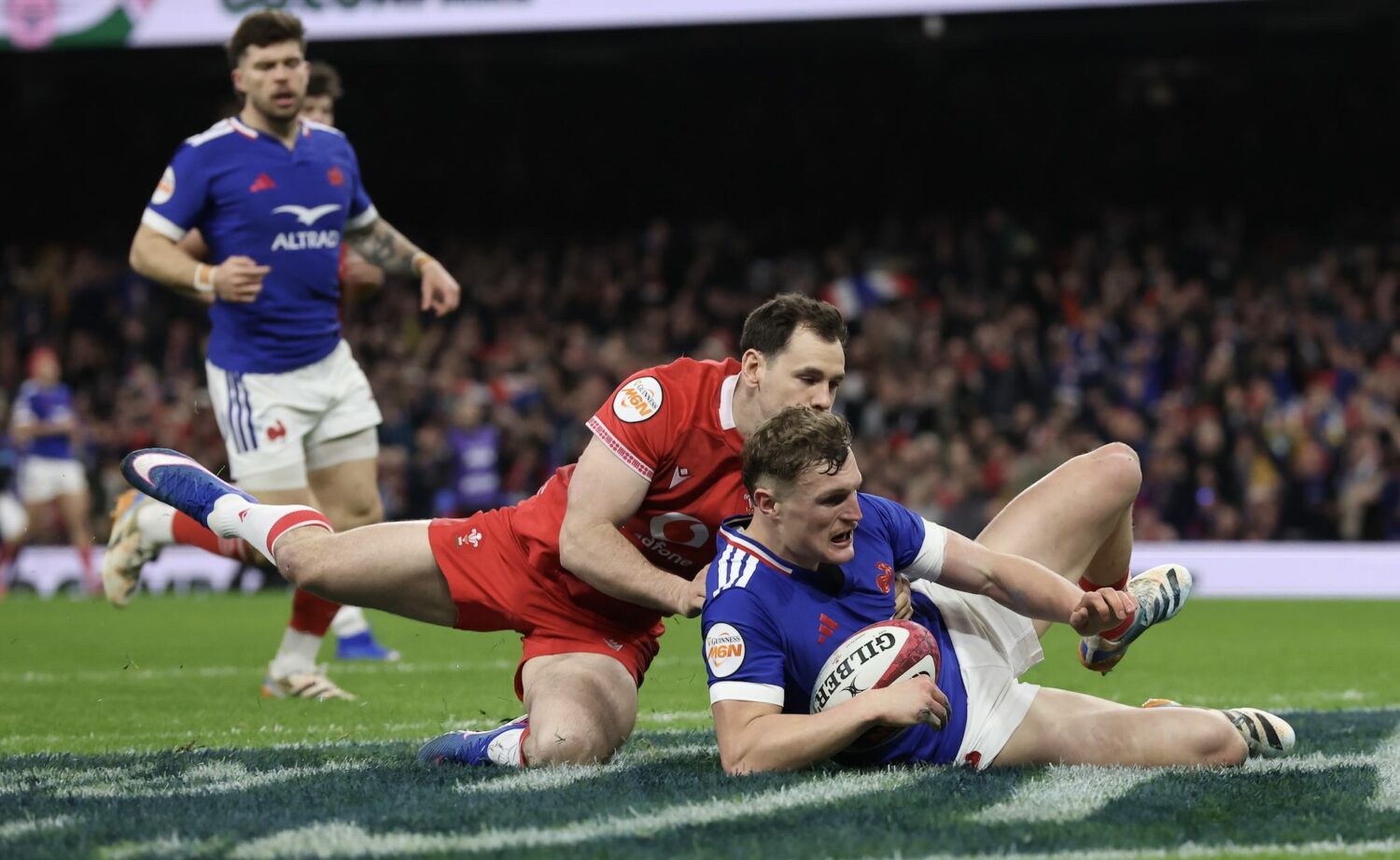
France are on fire, dispatching Wales with ease in Cardiff in Round 2 of the Six Nations. Scotland were the Brave and Ireland were the fortunate in Dublin. But on the evidence of two Rounds the world champions and No 1 ranked Springboks are still some way ahead of the chasing pack, which is more France than anyone else.
For those who don’t have time to scan every rugby site for Six Nations reaction, here is your summary, with the scanning brilliance of Chat and my own wrap and understanding of what unfolded.
AFRICA PICKS: DID YOU CASH IN ON YOUR SIX NATIONS BETS?
WALES v FRANCE (Cardiff) Reaction: “France are ruthless; Wales are broken”
Result context: France ran in 8 tries and hammered Wales 54–12 in Cardiff.
Six Nations official tone: “record-breaking” French performance; clinical, fast, and brutal.
The Northern Hemisphere themes (what the NH media agreed on)
1) France’s attack is now operating at “Grand Slam pace.”
The common thread: France didn’t just win – they stacked pressure, scored early, and never came down. Their execution looked title-ready, not “round-two ready.”
2) Jalibert ran the game; the French back three feasted.
Reuters singled out Matthieu Jalibert as “masterful”, with France’s shape and kicking hurting Wales repeatedly.
The Guardian focus: wings/finishers cashing in, with Théo Attissogbe front-and-centre.
3) Wales’ defensive system was the story and not in a good way.
Wales missed 31 tackles, with a 68% tackle success figure doing the rounds.
It also wasn’t lost on anyone that the crowd mood and attendance reflected a nation’s frustration.
-
Six Nations official: framed France as the tournament’s most clinical force; “run riot / record-breaking” framing.
-
Reuters: Jalibert masterclass; Wales defensive collapse; low attendance noted.
-
The Guardian: Attissogbe-led romp; France’s young backs looked fearless; Wales outclassed.
South African view (SA Rugby Mag / SA angle)
-
SA Rugby Mag (digital): blunt headline energy – “Rampant France rout woeful Wales” and the key SA takeaway: France are the only side still tracking a Grand Slam after two rounds.
-
Times Live: explicitly positioned this French run as a Springbok warning shot, tying it to SA’s own demolition job in Cardiff last November.
SCOTLAND v ENGLAND (Murrayfield) Reaction: “Scotland ambushed them; England had no Plan B”
Result context: Scotland beat England 31–20 and lifted the Calcutta Cup, ending England’s long winning run.
The Northern Hemisphere themes
1) Scotland’s start won it (and England never truly recovered).
Reuters captured it cleanly: Scotland sprinted into an early lead and played with belief; England spent the match chasing field position and control.
2) Finn Russell ran the show.
Across reports: Russell was the conductor control when needed, ambition when it was on.
3) Discipline (and Arundell) became England’s headline.
The red-card narrative dominated English-facing reaction, especially tabloid coverage.
4) “Plan A stalled” became the RugbyPass verdict.
RugbyPass pushed the familiar critique: England look blunt when their first pattern doesn’t land.
-
The Guardian: Scotland “stunned” England; big tries, big moments, and England’s errors/discipline issues.
-
Reuters: Scotland’s recent Calcutta Cup dominance underlined; Russell masterclass; Arundell card pivotal.
-
The Sun: framed it as Arundell “hero-to-zero”, Grand Slam hopes crushed on the Murrayfield hoodoo.
-
Sky Sports: breakdown angle on why England unravelled (discipline, start, game control).
South African view (SA Rugby Mag)
-
SA Rugby Mag: “Storming Scotland end England’s winning run” straightforward: England’s streak snapped; Scotland revived their campaign; Townsend milestone context.
-
SA Rugby Mag follow-up: quotes/angle pieces include Borthwick acknowledging England “gave them too big a start.”
IRELAND v ITALY (Dublin) Reaction: “Italy proved they belong; Ireland survived”
Result context: Ireland won 20–13, but the reaction was far more about Ireland’s wobble and Italy’s growth than Irish dominance.
The Northern Hemisphere themes
1) Ireland were “unconvincing” Italy dragged them into a scrap.
That “Ireland survived” framing is consistent across live reports and match wrap language.
2) Italy’s first-half performance made the story.
Italy led at the break; a maul try and defensive bite put Ireland under heat.
3) The Italian press angle: pride + frustration (and ‘it was there’).
Italian coverage leaned into: “great Italy for a half”, match flipped after the break, and the missed chance to land a historic result.
Outlet-by-outlet snapshot (Ireland + Italy)
-
Irish Times: Italy led 10–5 at half-time; Ireland turned it with second-half tries (Conan/Baloucoune) to regain control.
-
The Independent (UK): headline framing: “Unconvincing Ireland overcome half-time deficit” again, the win without the glow.
-
Gazzetta dello Sport (Italy): strong Italy for a half; Ireland “trembled” but won; the swing came after the break.
-
RAI News (Italy): second half “capsized” what looked like an Italian day; Italy started “azzurro” but Ireland flipped it.
-
Federazione Italiana Rugby (FIR): official Italian union tone: “grandissima Italia” that scared Ireland; positives to take even in defeat.
-
OnRugby (Italy): positioned it as the “almost” moment and a national conversation piece (reaction roundup).
FOR ALL THE LATEST PLAYER AND TEAM STATS FROM ROUND 2 OF THE SIX NATIONS
-
2026 Six Nations fixtures:
https://www.keo.co.za/2026-six-nations-fixtures-confirmed-france-to-open-blockbuster-campaign-on-a-thursday/ -
France v Ireland analysis:
https://www.keo.co.za/how-transformed-france-tortured-inept-ireland-in-paris/ -
Previous British media reaction piece:
https://www.keo.co.za/england-hammer-wales-as-british-media-deliver-brutal-six-nations-verdict/
International Rugby
Super Rugby Pacific: South African rugby is bigger without you
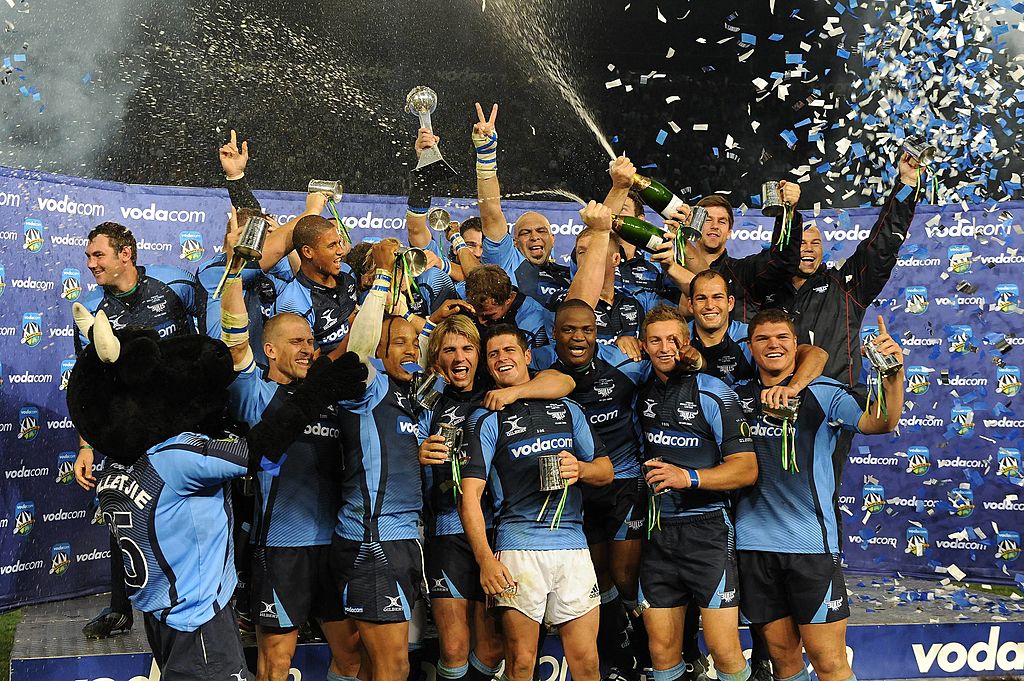
A message to Super Rugby Pacific. South Africa doesn’t want back into your competition. Not now. Not ever.
Super Rugby Pacific CEO Jack Mesley, speaking to Martin Devlin on DSPN, dismissed the idea of South African teams ever returning.
Pressed directly, he said:
“No.”
Asked why he would not welcome South Africa back into the competition, Mesley replied:
“If you go back and look at the data, those games did not rate well. They did not attend well. They did not rate like we’re rating now. They did not attend like we are attending now.”
He added:
“I think there is a romance associated with the South African days.”
Devlin joked:
“It always is about the girlfriend who leaves, mate.”
Mesley laughed and concluded:
“Even a South African one.”
Romance?
Let’s deal in reality.
The Springboks have thrived post Super Rugby’s exit.
Since South Africa shifted north post-Covid and into the United Rugby Championship and Investec Champions Cup, the Springboks have become the dominant force in world rugby.
- Two Rugby World Cups in 2019 and 2023.
- Back-to-back Rugby Championship titles in 2024 and 2025.
- Five wins in their last six Tests against the All Blacks.
- A record 43-10 demolition in Wellington.
- A 35-7 humiliation at Twickenham.
This is more a measurable dominance than it is a sentimental nostalgia.
South African clubs now play in a weekly high-intensity cross-hemisphere competition against Ireland’s provinces, French heavyweights and English power clubs. They play against Welsh, Scottish and Italian teams. The URC and Champions Cup demand travel, adaptability, and confrontation with contrasting styles.
It has hardened South African players tactically and physically.
They are preparing for Test rugby and World Cups. This is not the exhibition of Bledisloe or the basketball of Super Rugby Pacific.
The All Blacks have regressed since South Africa left Super Rugby
New Zealand’s post-Covid Test record tells a different story.
For the first time in the professional era, the All Blacks have looked physically vulnerable. They have been bullied at the collision and they have lost multiple home Tests. They have been beaten consistently by the Springboks.
The annual three-week Super Rugby tours to South Africa once conditioned New Zealand franchises for brutality. Playing the Bulls at Loftus, the Stormers in Cape Town, the Sharks in Durban, and making trips to Bloemfontein and Ellis Park were a weekend physical audit.
That audit no longer exists.
Super Rugby Pacific is now largely an internal New Zealand competition with Australian and Pacific participation. The physical edge that South African teams brought has disappeared.
Eddie Jones, speaking to Devlin, bluntly addressed the decline.
“That’s the other thing that’s changed for New Zealand Rugby; Super Rugby was the greatest influence on world rugby for a long period of time. Whatever happened in Super Rugby basically set the trend for the game.”
He continued:
“Unfortunately, Super Rugby has dropped in terms of status. We all know South Africa has left, and now it’s a competition that doesn’t have as much influence around the world.”
What Jones is articulating is the structural erosion of the competition. Super Rugby, in its original Super 12 guise, had no equal in world rugby’s club environment. Super Rugby Pacific is now an afterthought to competitions like the Investec Champions Cup, the URC, the English Prem and France’s Top 14.
Super Rugby Pacific produces strong local derbies and healthy domestic numbers, but globally, its relevance has shrunk.
The winner is almost invariably a New Zealand side, the style is about attack and little regard for the nuances of Test rugby, especially World Cup rugby, and the buzz word is entertainment, ball in play and no respect for the pressure moments that define World Cup titles.
Test rugby is not exhibition rugby.
When confronted by the Springboks’ power game or France and England’s pack-driven precision, the All Blacks have looked less conditioned for the grind.
South Africa, meanwhile, are conditioned weekly in Europe and then sharpened further in the Rugby Championship.
The Arrogance
New Zealand Rugby previously dismissed South Africa’s contribution to Super Rugby. The outgoing CEO Mark Robinson made clear that the competition would move on without South Africa before even formally informing SA Rugby leadership.
Robinson, an average All Black, has been even more mediocre as NZ Rugby CEO. His reward for cocking it up was to get a job from his Aussie mate (World Rugby Chair) and namesake Brett Robinson, as the Chief of Rugby.
Chief of Rugby? What the Chair means is a portfolio created before appointing Robinson as the CEO of World Rugby.
It is messy, but not as messy as the illusion that Super Rugby Pacific has a global appeal.
SUPER RUGBY PACIFIC CEO MESLEY MOCKS SA RUGBY
Mesley speaks of romance and laughs at the idea of a South African return. Look, he is an Aussie, so that explains a few things.
But to believe he knows rugby is a stretch, despite the purple prose on his appointment.
Super Rugby Pacific Chair Kevin Malloy said Mesley’s strong marketing background and practical skillset made him ideally suited to the Super Rugby Pacific CEO role.
“What set Jack apart from a strong pool of candidates following a thorough search was his passion for rugby, his enthusiasm and a breadth of experience in both marketing and sports,” Malloy said.
OK, if you want to believe that Kev!
These are strange times in New Zealand rugby.
An ex-All Black in Robinson rejuvenated the Springboks in kicking South Africa out of Super Rugby and an Aussie marketer has added to New Zealand’s misery with his promotion of an insular Pacific competition.
The irony in the Republic is that South Africa still respects New Zealand. It is the Test South Africans always want to experience.
The Greatest Rivalry Tour later this year is sold out, within hours of tickets going on sale.
The All Blacks remain rugby’s most recognisable brand in South Africa, and there is no smugness in the Republic when South African rugby people speak of NZ Rugby or the All Blacks. There is only respect and a varying degree of adulation.
Mesley speaks with a smirk about South African romance in Super Rugby, but the South African game has grown stronger on every front since moving north and New Zealand rugby has grown smaller without South Africa.
There is a word in South Africa for dismissive arrogance dressed up as data. There is a word for Mesley.
It starts with a P … and it isn’t Pacific.
International Rugby
England hammer Wales as British media deliver brutal Six Nations verdict

England didn’t just hammer Wales 48-7 at the Allianz Stadium in Twickenham; they reminded the visitors that they will only be good for the wooden spoon in the 2026 Six Nations.
The contest was over before kick-off but confirmed as officially over before the 20th minute when Wales trailed 10-0 and were reduced to 13 players. That score doubled to 22-0 before the 30th minute and it could have been even more damning but for England’s inaccuracy and many poor decisions when playing 15 versus 13.
The British media were ruthless in their assessment of England’s demolition of the Welsh, with the flameless Dragons offering no resistance. Their discipline collapsed, belief vanished, and England didn’t need to be spectacular to be savage.
Henry Arundell scored a hat-trick and No 10 George Ford was voted Player of the Match. Wales’ catastrophic discipline, turned a historic rivalry into a one-sided examination.
Across the UK press, the only argument was about how deep Wales’ problems run.
Planet Rugby
Planet Rugby framed the match as an England statement, focusing on clarity of attack and ruthless punishment of Welsh indiscipline. Their assessment was that England didn’t chase miracles – they simply played what was in front of them and dismantled a side repeatedly reduced by yellow cards.
🔗 https://www.planetrugby.com
RugbyPass
RugbyPass led with England “running riot”, highlighting Arundell’s finishing and Ford’s authority at No 10. The tone was decisive: Wales lost control early and never recovered, leaving England to dictate tempo, territory and scoreboard.
🔗 https://www.rugbypass.com/news/england-stars-run-riot-as-wales-dismantled-in-six-nations-opener/
BBC Sport
BBC Sport focused on England’s composure, stressing how quickly the contest slipped away once Wales started collecting yellow cards. England were praised for discipline and patience – doing nothing spectacular, but everything right.
🔗 https://www.bbc.com/sport/rugby-union
The Guardian
The Guardian called it a resounding win, pointing out England left points on the field while Wales self-destructed. Their report linked the performance to wider Welsh instability, suggesting the problems extend well beyond 80 minutes.
🔗 https://www.theguardian.com/sport/2026/feb/07/england-wales-six-nations-match-report
Rugby365
Rugby365’s reaction was blunt and familiar: ill-discipline killed Wales, England simply obliged. The outcome was decided early, repeated penalties and cards ensuring no route back.
🔗 https://rugby365.com
SA Rugby Magazine
SA Rugby Mag viewed the result through a global lens – England rising, Wales regressing. Less about the score, more about trajectory, with England building momentum in winning for a 12th successive match, and Wales stuck in survival mode.
🔗 https://www.sarugbymag.co.za
Welsh response
Welsh media reaction were more sombre than angry. Discipline, fragility and a lack of physical authority were recurring themes. The concern is no longer about losing to England; it’s about how easily Wales are folding under pressure.
*Italy beat Scotland 18-15 in Saturday’s early game.
HOW THE MEDIA RATED FRANCE BEATING IRELAND 36-14
ALL THE PLAYER AND TEAM STATS FROM ROUND 1 MATCH CENTRE OF THE 2026 SIX NATIONS
International Rugby
How transformed France tortured inept Ireland in Paris
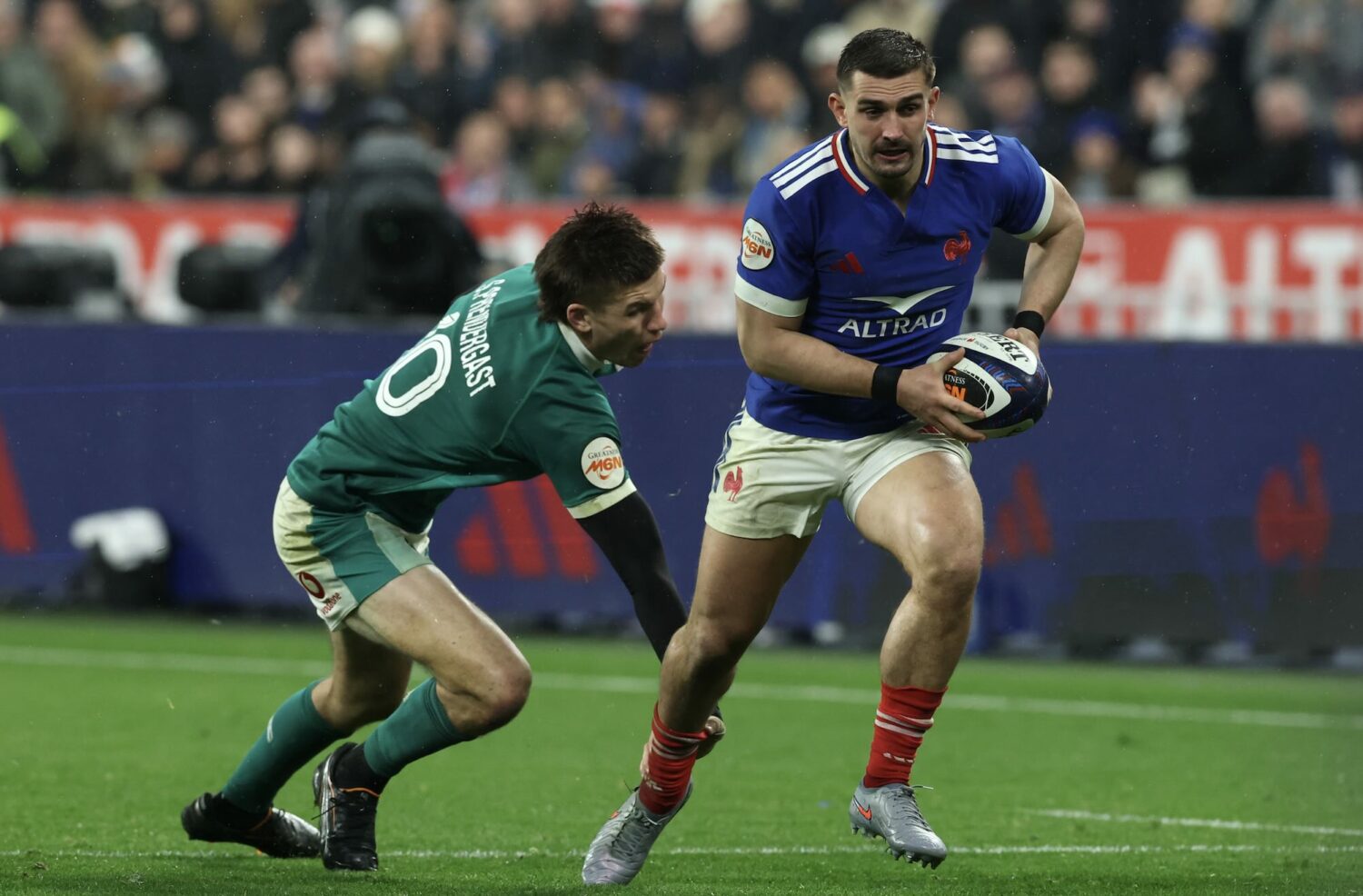
France changed players, approach and tactics to torture Ireland 36-14 in Paris in the Six Nations. We look at the difference between 2026 win and the 2025 win by France against Ireland in Dublin.
Ireland 27 France 42
Six Nations 2026 – Paris
France 36 Ireland 14
Here’s what France did differently.
1) 2026: France dominated the match. 2025: France stole it with efficiency.
Dublin 2025: Ireland had 58% possession and 53% territory, and France still won by 15. France were happy to defend for long stretches (they made 187 tackles) and then punish Ireland when the game fractured.
Paris 2026: France flipped that script. They had 55% possession and 59% territory and played the game mostly in Ireland’s half. That’s not “clinical counterpunching”. That’s control.
The tell: France ran for 588 metres in 2026 vs Ireland’s 385. In 2025 it was basically even (474 vs 477). France went from “equal metres, better strike-rate” to “more ball, more territory, more metres, more everything.”
2) 2026: France carved Ireland open. 2025: France finished better than Ireland.
Clean breaks
-
2025: France 7 clean breaks, Ireland 5 (tight margin).
-
2026: France 19 clean breaks, Ireland 5 (a gulf).
That’s the difference between a game you win and a team you hurt.
3) 2026: France’s pressure forced Irish errors at scale.
Ireland’s “handling under heat” fell apart in Paris:
-
2026 turnover knock-ons: Ireland 11, France 6
-
2025 turnover knock-ons: Ireland 7, France 3
France didn’t just wait for mistakes in 2026. They manufactured them with territory, line-speed, and contestable moments.
4) 2026: Ireland couldn’t tackle France. In 2025 they couldn’t stop France finishing.
-
2025 missed tackles: Ireland 23 (France 16)
-
2026 missed tackles: Ireland 42 (France 21)
That’s not “a few soft shoulders”. That’s structural stress: repeated breaks, repeated reloads, repeated one-on-ones lost.
5) 2026: France won the first hour. 2025: France won the key moments (and the second-half surge).
In Paris, Ireland were 29–0 down before they got going. France had already cashed the bonus point and then eased.
In Dublin, France’s big statement was the second-half blitz, after losing Antoine Dupont early (he went off around the half-hour and later it was confirmed as a cruciate injury).
So:
-
2025: a win built on resilience + clinical finishing after disruption.
-
2026: a win built on front-foot brutality + sustained dominance.
6) The halfback axis changed – and so did the type of threat.
In 2026, with Ntamack out, Jalibert started and had a direct hand in multiple tries, while Dupont called their connection “very positive.”
That matters tactically: Jalibert tends to play flatter and more visibly, and France’s attack in 2026 looked like a team choosing to rip you open in-phase, not just punish you when you overplay.
The simplest summary
Dublin 2025: France were ruthless in chaos – even while defending for long spells.
Paris 2026: France were ruthless in control – more territory, more breaks, more metres, and Ireland cracked.
This is where the regression is most obvious – and most damaging.
1) Physical dominance at the contact point
Ireland’s biggest slide is brutally simple: they are no longer winning collisions consistently.
Against France in Paris, Ireland were regularly knocked backwards in contact, which killed their ability to play fast, accurate phase rugby. Once that happens, everything else collapses – tempo, shape, decision-making.
A season earlier in Dublin, Ireland could still absorb France’s power and recycle quickly. In 2026, France dictated the gainline on both sides of the ball and Ireland were playing from behind bodies instead of on top of them.
This is the clearest regression because Ireland’s entire system is built on fast ruck ball. Take that away and the system has no oxygen.
2) Defensive resilience under sustained pressure
Ireland used to bend without breaking. They now bend, fracture, and then leak tries.
The missed-tackle spike in Paris wasn’t about effort – it was about:
-
repeated reloads
-
fatigued edge defenders
-
centres and back-three players making late, reactive reads
In Dublin 2025, Ireland could survive France’s big moments and reset. In Paris 2026, once France scored early, Ireland never regained defensive authority. The scoreline at halftime wasn’t a fluke it was the logical outcome of structural stress.
3) Attacking clarity without Johnny Sexton
This is not about nostalgia – it’s about control.
Ireland have regressed in:
-
in-game management
-
territory selection
-
when to slow down a match
In Paris, Ireland chased the game far too early, forcing passes under pressure instead of building pressure. Sexton’s absence isn’t about individual brilliance – it’s about knowing when not to play.
Ireland still have quality decision-makers, but they don’t yet have a single, dominant conductor who can steady the ship when momentum is gone.
4) Backline punch against elite defences
Ireland’s backs no longer frighten top-tier defences the way they did in 2022–2024.
Against France:
-
line breaks were rare
-
defenders were not fixed
-
edge space was never clean
France could defend honestly and aggressively, without having to overfold or gamble. That is a massive red flag.
A year ago, Ireland could create indecision. In Paris, France defended with certainty.
5) Psychological authority
This is subtle – but it matters.
Ireland used to walk onto the field believing they could impose themselves on anyone. In Paris, once France landed early blows, Ireland looked like a team hoping the storm would pass rather than one capable of changing the weather.
The best Ireland sides of recent years could absorb momentum swings and reassert control. This version struggled to do either.
The uncomfortable truth
Ireland haven’t fallen off a cliff – but they have slipped off a plateau.
They are no longer physically dominant, tactically inevitable, or psychologically imposing against the very best.
FRANCE 36 IRELAND 14: EVERY PLAYER AND TEAM STAT
AFRICA PICKS: YOUR BEST MONEY-MAKING SIX NATIONS BETS
*CHAT supported
International Rugby
Fiery French applauded as alarm bells ring for Ireland
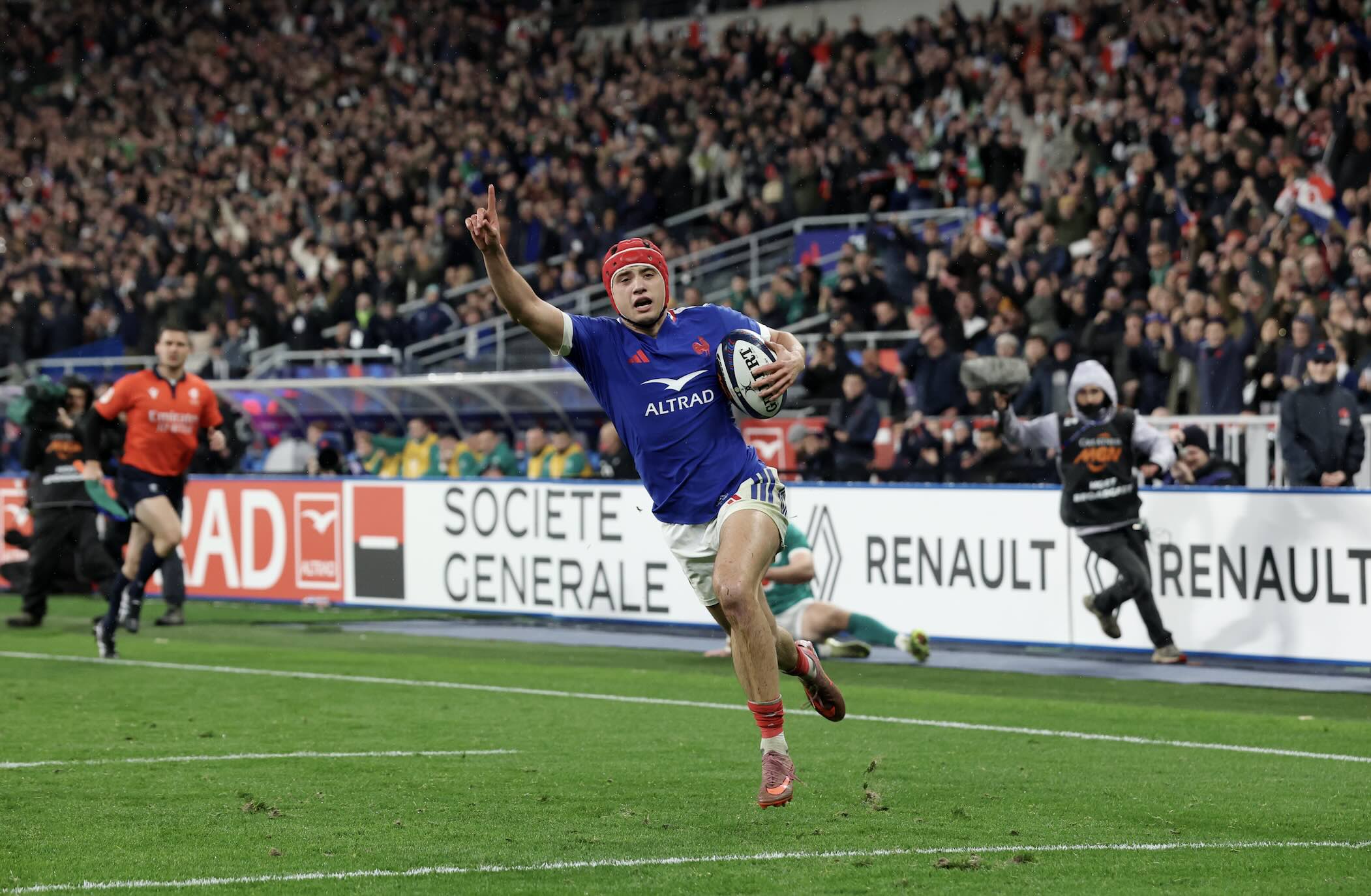
Conviction in the performance, but caution in the storytelling summarised the French media reaction to their brutal 36-14 Six Nations win against Ireland Paris. For the Irish, it was a case of alarm bells ringing.
France had destroyed the Irish in Dublin 42-27 a season ago having led 42-15 with 10 minutes to play. Two late tries added some comfort for Irish supporters. Then came the defeat to the All Blacks in Chicago and the humiliation against the Springboks in Dublin.
Paris was equally damning for Ireland as they were steamrolled.
France led 22 nil at half time and 29 nil after 57 minutes.
Two Irish tries between the 60th and 65th minutes offered more caution to France than hope to Ireland and the hosts finished the final five minutes attacking the Irish try line before crossing for their fifth try.
France are the bookies’ favourites to defend the Six Nations title won last season.
I asked my mate at ChatGPT to do a round up of how the Irish and French Rugby Media reacted to the match.
The Irish Times
Tone: bruised realism.
Summary: framed it as a throwback “Parisian beating” and a reminder of “bad old days” patterns, with Ireland blown away early and left trying to salvage dignity late.
Irish Independent
Tone: alarm bells, big-picture worry.
Summary: leaned into “new reality” language: Ireland didn’t lose a classic, they lost a mismatch, and the margin could have been uglier without the late rally.
Irish Examiner
Tone: sharp critique of Ireland, plus the French pace-setter angle.
Summary: sold it as France starting and finishing with a flourish while Ireland were “abject” for too long; a fast French start “filleted” Ireland before the game ever became a contest.
The Times
Tone: statement win, title warning shot.
Summary: framed it as France sending a message to the championship, with the emphasis on the bonus-point dominance, the early avalanche to 29–0, and Ireland being outmuscled and out-thought until the contest was gone.
L’Équipe (“Le Quippe”)
Tone: controlled praise with a small caution.
Summary: credited a brilliant, accurate French first-half and “seductive” spell, then noted France were less sovereign after the break when they conceded two tries that slightly stained the overall polish.
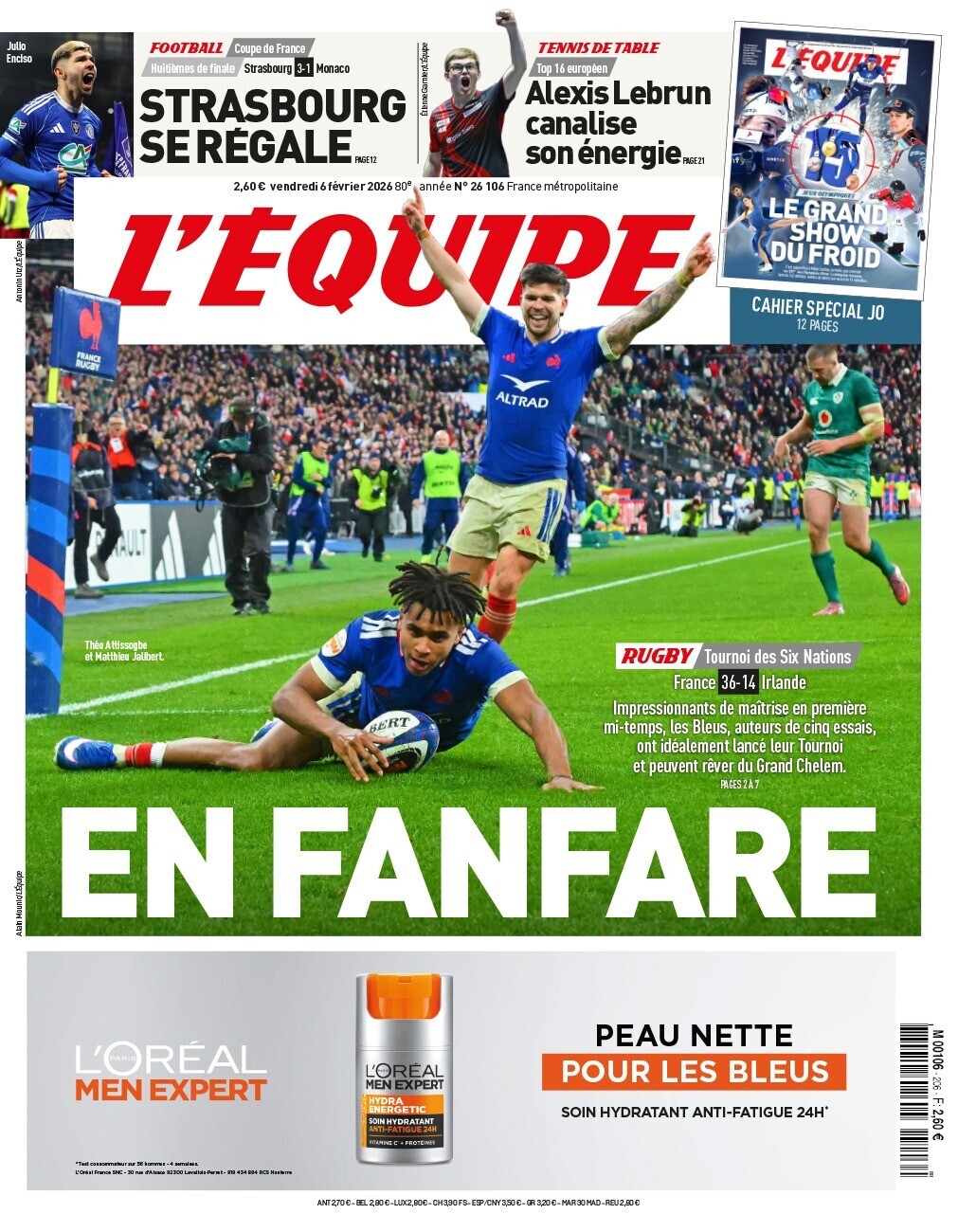
Rugbyrama
Tone: France’s tempo and discipline as the headline.
Summary: stressed how France’s pace exhausted Ireland, how clean the first-half was (discipline/accuracy), then pointed out Ireland only found daylight when France dropped intensity after building the lead.
SA Rugby Magazine
Tone: acknowledgement of quality and statement intent.
SA RugbyMag’s headlines framed the result as France making a statement in their Six Nations title defence, highlighting coach Fabien Galthié’s praise of France’s attacking display in Paris. The emphasis was on the dominance and intent shown by the defending champions rather than harsh analysis of Ireland’s shortcomings.
Rugby365
Tone: bold and definitive.
Rugby365 was unequivocal: France “made a statement” in this opener, labelling the performance a demolition job on one of the Six Nations’ traditional heavyweights. Their report leaned into the idea that France weren’t just winning they were announcing their intentions for the tournament from the first whistle.
Planet Rugby (South African audience perspective)
Tone: tactical and analytical.
Planet Rugby’s reaction, widely read by South African fans, focused on key takeaways from the match: France’s first-half masterclass, sharp player ratings (with Sam Prendergast singled out as struggling for Ireland), and how the French backs and playmakers ran the Irish defence ragged. They combined phrase-by-phrase insights with ratings and analytic angles rather than pure storytelling.
Overall SA reaction themes
South African rugby media weren’t interested in gentle language and they saw France’s dominance as clear and meaningful:
-
Statement performance: France announcing themselves as early title favourites.
-
Clinical attacking rugby: emphasis on the French backs and strategic intensity that pushed Ireland on the back foot.
-
Confirmation of expectations: the result was consistent with pre-match previews and broader Six Nations narratives.
International Rugby
Dupont gives France flex as Ireland face Paris power test
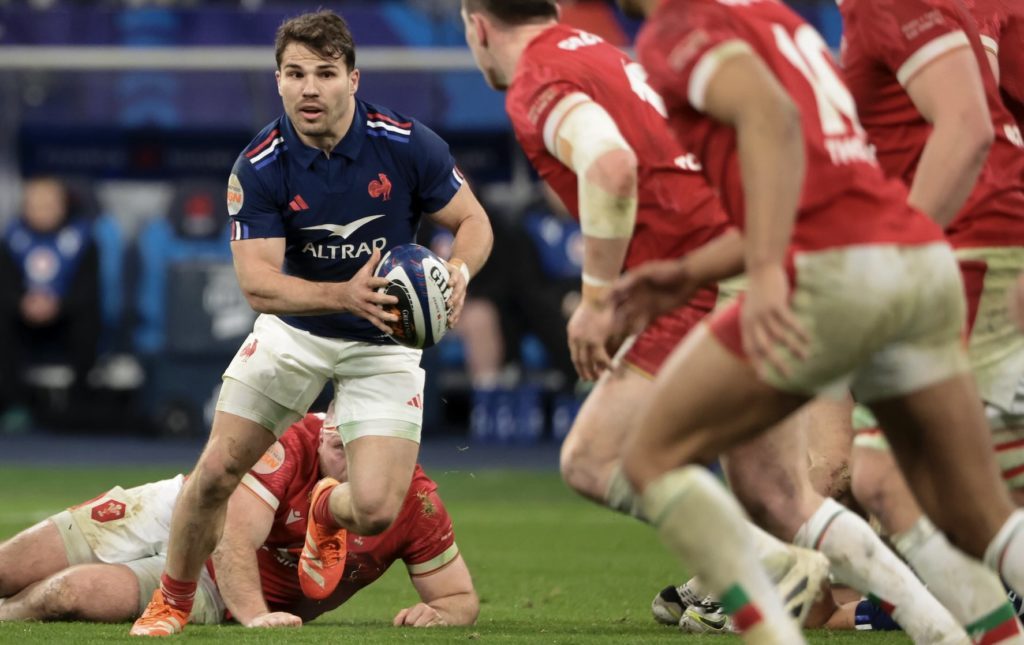
Antoine Dupont is the flex in a fantastic French match 23 that will be too powerful for Ireland in Paris in the Six Nations season opener.
Dupont alters the physics of the contest, and he adds an extra layer of muscle, authority and inevitability to a side already designed to win Test matches through force. His long injury absence is irrelevant now. What matters is what he brings back with him, and that is control, collision dominance and an edge.
Dupont is the best scrumhalf in the world and he he is the national team’s talisman.
But it is up front where all the work will be done for Dupont to play conductor. France’s selection confirm intent and physicality. It is a pack chosen for confrontation.
Jean-Baptiste Gros, Julien Marchand and Dorian Aldegheri are a front row built to scrum, carry and squeeze the life out of opponents, while locks Charles Ollivon and Mickaël Guillard bring physical presence, aerial dominance and edge in the tight exchanges. The back row of François Cros, Oscar Jegou and Anthony Jelonch are physically relentless and they feed off collisions.
This is a French pack that creates the tempo and then Dupont determines the range of this tempo.
Ireland’s pack has peaked and France coach Fabian Galthie would have studied their capitulation to world champions South Africa in Dublin last November. The Boks destroyed Ireland in the scrums and the collisions.
Props Thomas Clarkson and Jeremy Loughman face an enormous examination against Gros and Aldegheri, and if Ireland concede scrum dominance, their entire game model collapses because it is built on control, rhythm and precision rather than chaos.
The French halfback pairing only amplifies that threat. Matthieu Jalibert plays flatter and faster than the Ireland flyhalves of recent seasons, and Dupont’s presence ensures defenders are constantly torn between folding around the ruck or drifting early, a dilemma that France exploit ruthlessly.
Ireland’s continued struggle to replace the authority and game management of Johnny Sexton remains an issue. Sam Prendergast is a talent, but opening a Six Nations campaign in Paris against this French pack is a brutal assignment, and he will be targeted physically and mentally.
ALL THE 2026 SIX NATIONS FIXTURES
The Irish backline, stripped of key personnel, looks noticeably less imposing as a unit. Without Hugo Keenan at fullback, without the aerial pressure and edge of Mack Hansen and James Lowe on the wings, and without the direct power of Bundee Aki at inside centre, Ireland lack the punch that previously allowed them to play beyond the gain line.
France, by contrast, look balanced and settled, with Thomas Ramos offering control and goal-kicking, Louis Bielle-Biarrey providing genuine pace, and Jalibert bringing attacking ambition, supported by centres and wings comfortable in a collision-heavy Test.
Add the significance of the Stade de France on opening night, where French energy multiplies and visiting teams feel pressure accumulate with every lost carry and every retreating scrum, and the advantage tilts decisively towards the hosts. When France dominate the gain line and Dupont starts probing around fatigued forwards, Ireland will be forced to chase a game they are no longer structurally equipped to chase.
This is not about flair or reputation, it is about force, physical authority and control, and France hold the upper hand in the pack, at scrumhalf, off the bench and in the stands.
Just as they did in last season’s match-up in Dublin, which they won comfortably 42-27, having led 42-15 with five minutes to play.
AFRICA PICKS: ALL YOU NEED TO KNOW FOR YOUR FRANCE V IRELAND BETTING
My call: France 33 Ireland 22.
KEO News Wire
JP Pietersen & his street-smart Sharks school stuttering Stormers
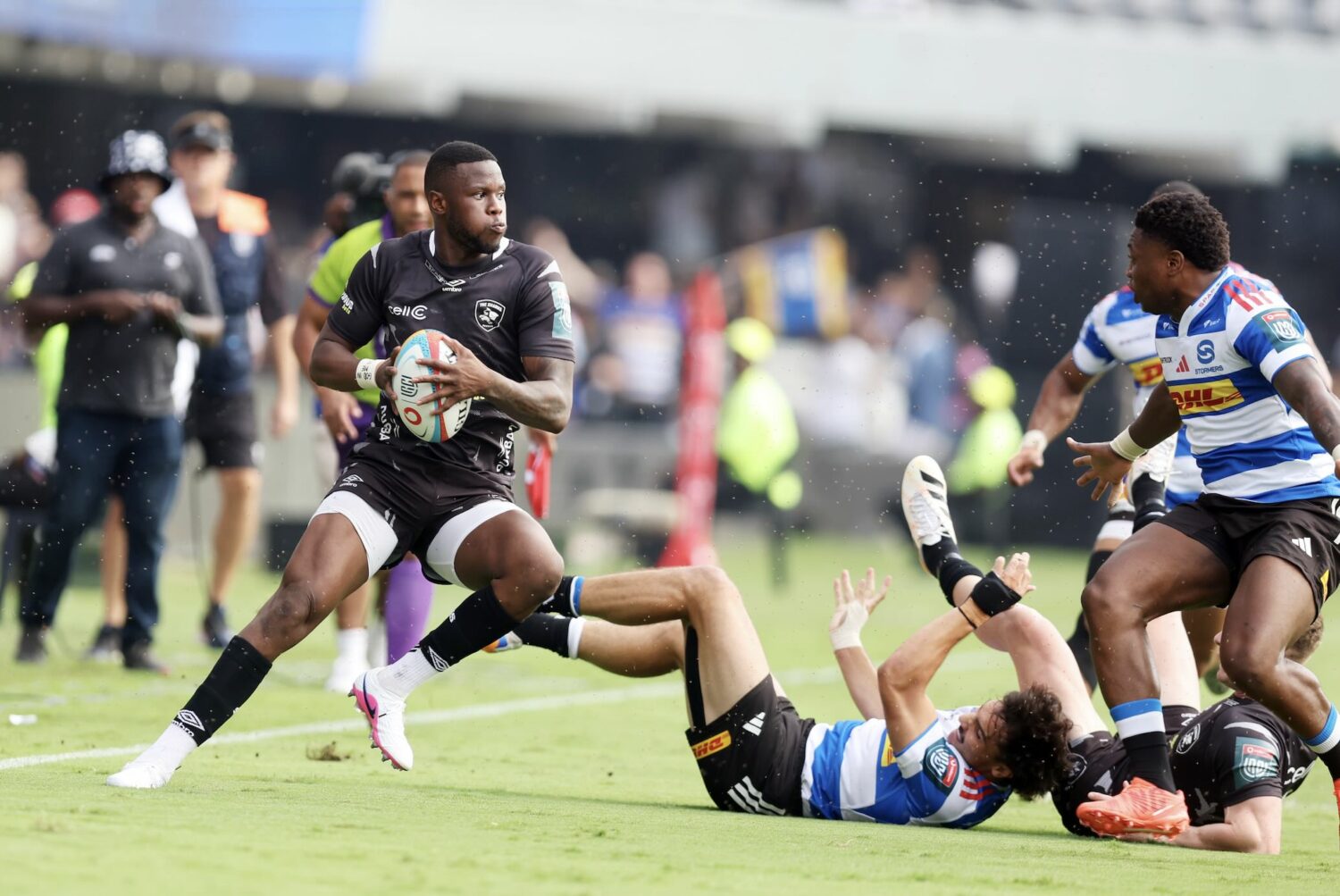
Give JP Pietersen the Sharks job and let him get on with it. He is not an interim measure. In the past fortnight he has done the double on the Stormers, and done it emphatically.
Pietersen, a presence of power and precision on the right wing in the Springboks 2007 Rugby World Cup title win in France, was given the Sharks head coaching job six weeks ago.
In that period, his team, so subdued and absent in the Investec Champions Cup and first eight rounds of the URC, have won four from five matches in all competitions. They have beaten Saracens in Durban in the Investec Champions Cup, hammered a makeshift Clermont and done the double over a Stormers team in the URC that had not lost in the league in eight matches.
Pietersen’s Sharks won 30-19 in Cape Town a week ago, having led 30-12 until the final minute, and in Durban a week later the 36-24 win was as emphatic.
The Stormers, pre the Sharks double header, were lauded for their attack and defensive structures. But they were outscored nine tries to five over 160 minutes, dominated in most facets, physically second to the Sharks in the moments that mattered and in the close exchanges, outthought, outplayed and out passioned.
In Cape Town too many suggested the Stormers were done a dirty by the referee. Already I am seeing a similar narrative on social media. Regardless, of the critique of match officials the Sharks won and the Stormers lost because over two Saturdays the Sharks were the better team, in game management, and in execution.
Pietersen has transformed the attitude of the squad. It is as much a compliment to the World Cup-winning wing, as it is an indictment on the situation under John Plumtree. These are the same players, but they look like two very different teams, coached by two very different individuals.
Pietersen’s decision to appoint Andre Esterhuizen as his captain, on the player’s 100th match, has proved inspirational. Esterhuizen has led and those around him have followed.
Individuals, so good for the Springboks, have played with the same intent and authority for the Sharks in the past fortnight,
Springboks, in the Sharks line-up, have played like current Springboks. The opposite has been true of the Stormers, who have looked fatigued, flat, confused in game plan, and in desperate need of a fortnight away from the game.
The Stormers have earned the right to drop a game or two because of a stunning eight successive wins in the league, but the nature of the back-to-back defeats can’t be ignored, which is disappointing.
The ill-discipline of Cape Town’s defeat continued in Durban. Two yellow cards in Cape Town and two in Durban. Repeated infringements, an inability to defend the Sharks line out maul, second in the collisions and second in most things.
The Stormers started the derby double header unbeaten and in 1st place. The Sharks were two wins from eight and in 14th. You would never have guessed that watching the 160 minutes.
There can be no argument from Stormers supporters. The Sharks did them, in the coaching game of chess, and on the field where the chess masters are the players.
Esterhuizen was supreme, Ethan Hooker was as strong, young Jaco Williams on the wing played like he had been there for a decade and No 9s Grant Williams and Jaden Hendrikse combined for the perfect package over 80 minutes. Williams plays with tempo and Hendrikse, when switched on, plays with poise.
The aerial battle was one-sided, in Cape Town and in Durban. This was a strength of the Stormers early season, but they couldn’t catch a high ball, even when gift wrapped with sticky gloves. The Sharks, in kick and chase, were superb.
The Sharks played like a team knowing every limitation and every strength. The Stormers continued to play like a team convinced they only have strengths.
Piestersen’s perspective has been refreshing, both in Cape Town and in Durban.
There has been a realism about him and his Sharks in the past fortnight and crazily there has been more romance than realism from a team that a month ago had not lost a game in any competition.
The Sharks head into the February break with one defeat from their last four matches, and the Stormers put their heads to a pillow with one win in their last four matches.
It makes for the most intriguing of returns in the latter part of February, when the URC resumes.
DOBBO AND SACHA RUE ILL-DISCIPLINE
ALL THE TEAMS AND MATCH-UPS FROM URC ROUND 11
KEO News Wire
Ackerman’s rampant Bulls go on the charge against Lions
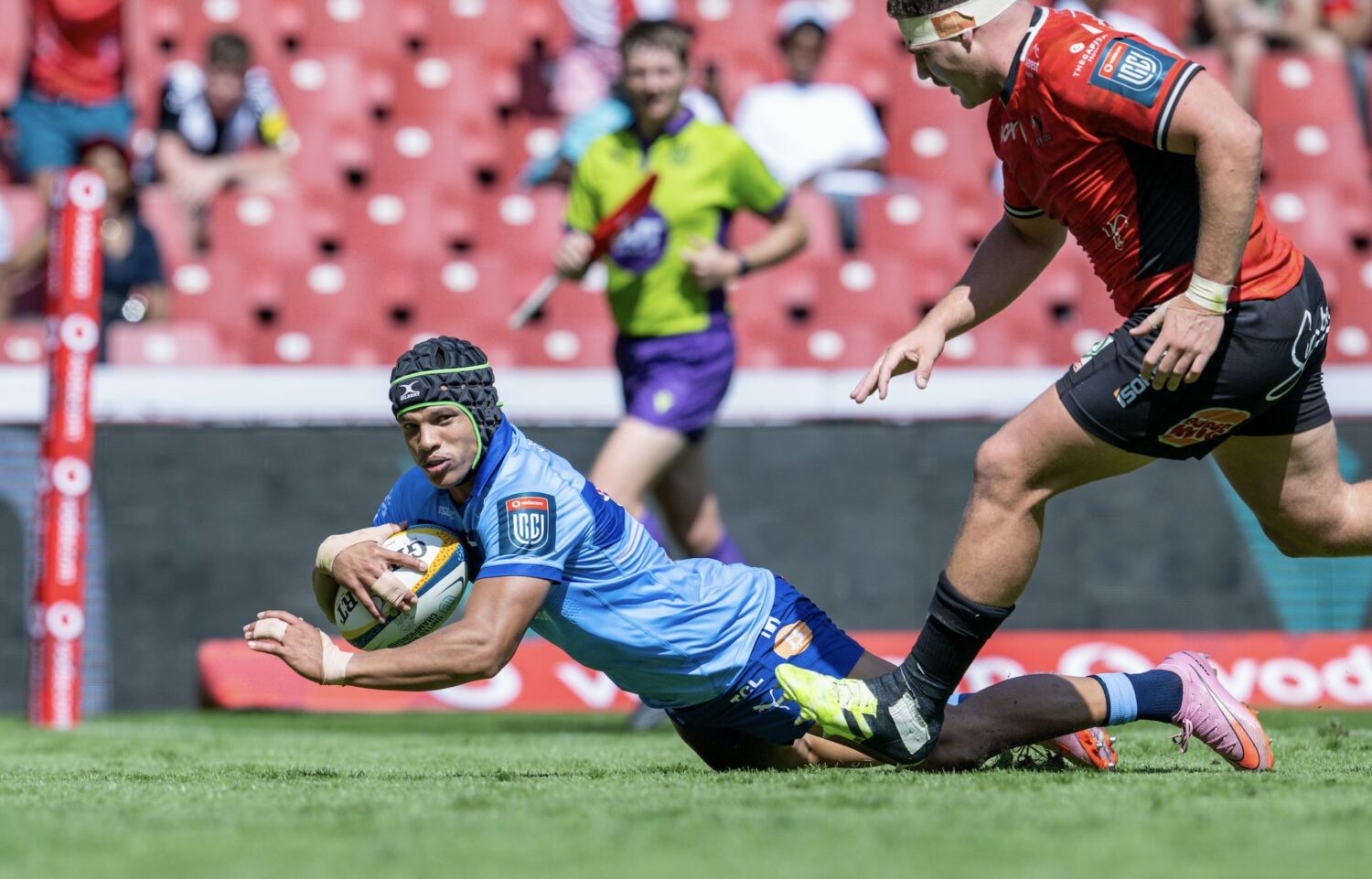
These are Johann Ackerman’s Bulls. Strong, physical, brave, enthusiastic, desperate and rugby intelligent. The Bulls who demolished the Lions 52-17 at Ellis Park in the Vodacom United Rugby Championship are the Bulls that have taken 14 matches in all competitions to confirm their 2025/26 season’s arrival.
The Bulls were so different, in every positive way, to the team playing a month ago.
They lost seven in a row in all competitions and were conceding on average 40 points a match and four-tries before half-time.
At Ellis Park, they kept the Lions scoreless for 40 minutes, conceded a try in the 45th minute and then coughed up one after the final whistle. In between they scored eight tries and dominated every facet.
They were very good in winning their third successive match on the road, in three different countries, after the horror run of seven defeats on the trot.
Ackerman once coached the Lions. They made two successive Super Rugby finals, hosting the Crusaders in the first one. He turned the Lions from a circus act into a national geographic documentary on why Lions should be respected.
It has taken two months longer than most thought, but now he is righting the wrongs of a Bulls team whose performances were a betrayal to the club’s history.
On Saturday, in the toughest of environments, a South African northern derby, the Bulls sent a message to every team in the league and to Glasgow, who they play in Glasgow in the Investec Champions Cup last 16 in April, that something has changed.
The bully boys in blue are back. Gone are the try-conceding fans of a freebie.
This is what Johan Ackermann has changed, as reflected in the post match reporting in South Africa.
1) The set-piece stopped being “a phase” and became a weapon
The Bulls earned the right to play, and it was not the Instagram version. This was real: scrum, lineout, maul threat, and then the carry pattern that forces defenders to make choices they don’t want to make. The tries were from repeat pressure and the Lions folding.
2) Discipline = possession that actually means something
“70% possession” is a dead stat if you hand it back with penalties, cheap turnovers and panic decisions. The Bulls didn’t. They played in the right areas early, squeezed the Lions, and were already out of sight at 26-3 at half-time. That’s control.
3) Defensive desire: no freebies and no soft shoulders
This was a Bulls attitude day more than a carnival all out attack day. This was 50 points scored because the pillars were bricks and not a hope for dodging quick sand areas at Ellis Park. The Bulls’ defensive work-rate and collision presence killed any Lions second half comeback prospects.
4) Carry, carry, carry… then strikes
This is the most important part: the Bulls’ attack looked better because the forwards made it simpler for everyone else. Hard carries, post-contact wins, and forward pods doing honest work so the backs don’t have to manufacture miracles from standing starts 20 metres beyond the gain line. This had Ackerman’s paw prints all over it.
5) Handre Pollard ran the game like a double World Cup winner
Pollard has been more accurate in games, but he played with presence and authority. With a functioning pack, led by a back three of Marcell Coetzee, Elrigh Louw and Jeandre Rudolph, Pollard played with the comfort of front foot ball and, outside of him, inside centre Harold Vorster looked like a teenager in his impact and enthusiasm.
WATCH: Keo and Zels on the Lions v Bulls
Scorers
Lions 17
-
Tries: Morne van den Berg, Bronson Mills
-
Conversions: Chris Smith (2)
-
Penalty: Chris Smith
Bulls 52
-
Tries: Harold Vorster (2), Johan Grobbelaar, Handré Pollard, Kurt-Lee Arendse, Embrose Papier, Mpilo Gumede, Keagan Johannes
-
Conversions: Pollard (5), Johannes
International Rugby
URC ROUND 11 – ALL YOU NEED TO KNOW
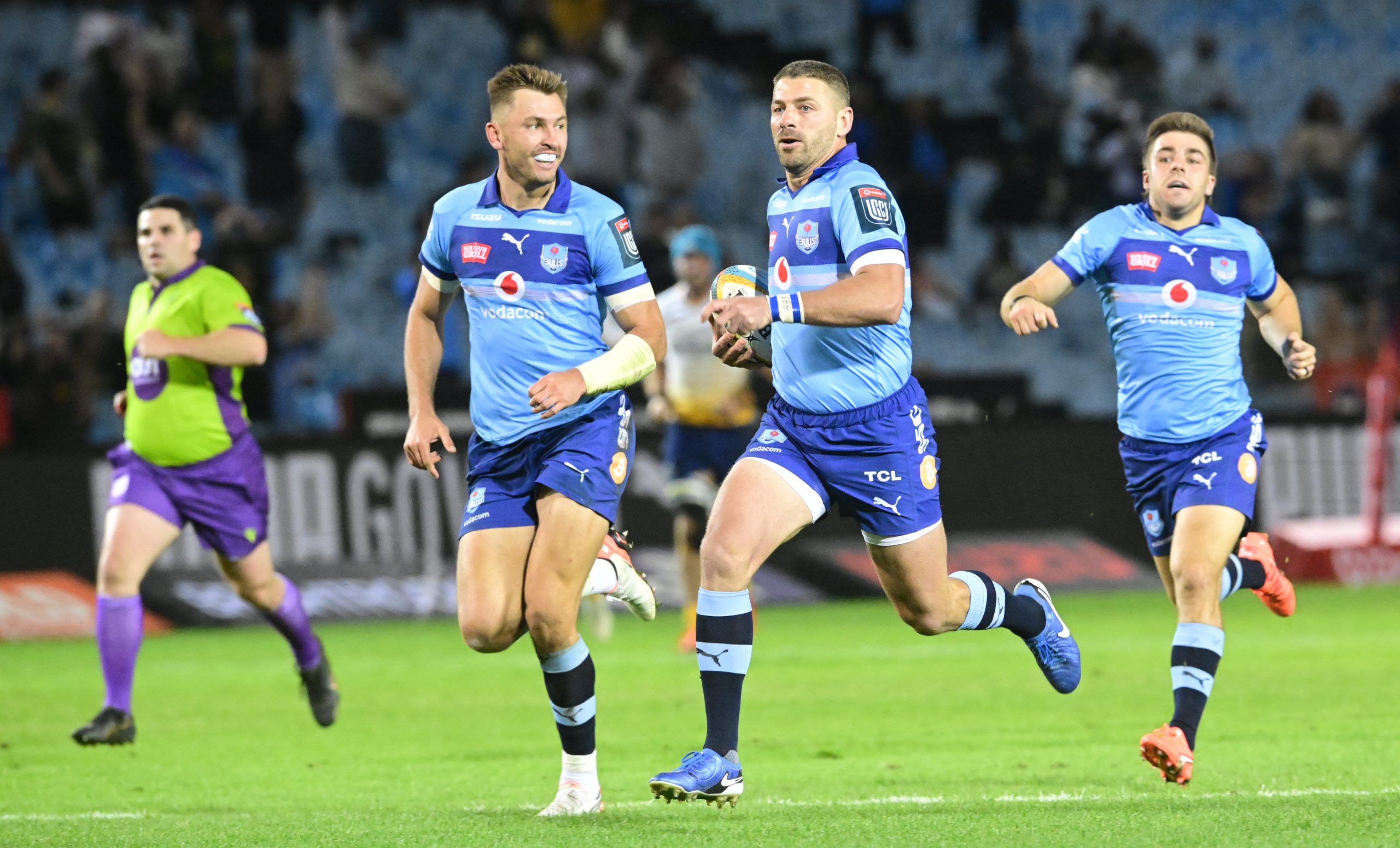
The Sharks host the Stormers in one of two South African URC derbies to end the first half of the league season. The Lions are at home to the Bulls in the northern derby. Here’s everything you need to know for the weekend’s Round 11 showdowns.
The South African teams have all chosen the best available squads in the last Saturday of the month and the last Saturday of URC action until the league resumes in the last weekend of February.
The Six Nations takes priority in February, with the first three rounds played before the URC starts up again for the last eight league matches and the play-offs.
The Stormers, beaten for the first time in the league last Saturday, get the chance of redemption in Durban. It was the Sharks who beat them in Cape Town. The same is true of the Lions and Bulls derby. The Lions earlier in the league, won at Loftus Versfeld in Pretoria.
Several of the Northern Hemisphere clubs are severely understrength for Round 11, as the leading current internationals have been in camp with their respective national teams preparing for next weekend’s Six Nations opening round.
It makes for a punter’s nightmare in these matches because the form guide is not a measurement with so many frontline players missing.
WATCH: KEO & ZELS ON SHARKS, STORMERS, LIONS & BULLS
AFRICA PICKS RUGBY: Keo calls the South African derbies
|
#BENvSCA
#GLAvMUN
#LIOvBUL
#SHAvSTO
#ZEBvCON
#LEIvEDI
#OSPvDRA
#ULSvCAR
|
|
FRIDAY, JANUARY 30 Benetton v Scarlets Stadio Monigo, Treviso – KO 19.45 IRE & UK / 20.45 ITA / 21.45 SA Referee: Andrew Brace (IRFU, 113th league game) AR 1: Clara Munarini (FIR) AR 2: Bisetto Luca (FIR) TMO: Olly Hodges (IRFU) Live on: Sky Italia, S4C, Premier Sports, SuperSport, Flo Rugby & URC.tv Benetton: Rhyno Smith, Ignacio Mendy, Paolo Odogwu, Malakai Fekitoa, Onisi Ratave, Nicolas Roger Farias, Andy Uren (CAPT), Thomas Gallo, Siua Maile, Marcos Gallorini, Giulio Marini, Eli Snyman, Alessandro Izekor, Jadin Kingi, So’otala Fa’aso’o Replacements: Bautista Bernasconi, Destiny Aminu, Tiziano Pasquali, Scott Scrafton, Nelson Casartelli, Alessandro Garbisi, Matt Gallagher, Filippo Drago
Scarlets: Jac Davies, Macs Page, Joe Roberts, Johnny Williams (CAPT), Tomi Lewis; Carwyn Leggatt-Jones, Gareth Davies, Alec Hepburn, Marnus van der Merwe, Archer Holz, Jac Price, Sam Lousi, Max Douglas, Jarrod Taylor, Fletcher Anderson Replacements: Harry Thomas, Josh Morse, Henry Thomas, Jake Ball, Dan Davis, Dane Blacker, Billy McBryde, Iori Badham Benetton Head Coach Calum MacRae said: “Scarlets are one of the Vodacom URC teams that uses the kicking game the most and builds their opportunities through territorial control. The aerial game is an area we definitely need to improve”
Scarlets Interim Director of Rugby Nigel Davies said: “We have looked at these Vodacom URC games, Ulster and Benetton, as a two-game series and it’s important we back up last weekend’s win – we’ve done the first bit, now our focus is on another massive game. “Benetton have recruited well, are coached well and play a good brand of rugby. Like us, they have players missing but will still be very strong. We have selected a side with a lot of talented young players who I am excited to see step up to the challenge on Friday night.” Glasgow Warriors v Munster Rugby Scotstoun Stadium, Glasgow – KO 19.45 IRE & UK / 20.45 ITA / 21.45 SA Referee: Craig Evans (WRU, 72nd league game) AR 1: Ian Kenny (SRU) AR 2: David Sutherland (SRU) TMO: Adam Jones (WRU) Live on: Premier Sports, TG4, SuperSport, Flo Rugby & URC.tv Glasgow Warriors: Josh McKay, Kyle Rowe, Stafford McDowall (CAPT), Kerr Yule, Ollie Smith, Dan Lancaster, Ben Afshar, Jamie Bhatti, Seb Stephen, Murphy Walker, Alex Craig, Jare Oguntibeju, Euan Ferrie, Angus Fraser, Ally Miller Replacements: Grant Stewart, Nathan McBeth, Sam Talakai, Dylan Cockburn, Sione Vailanu, Macenzzie Duncan, Jack Oliver, Matthew Urwin
Munster Rugby: Mike Haley, Thaakir Abrahams, Shane Daly, Dan Kelly, Diarmuid Kilgallen, Tony Butler, Ethan Coughlan, Josh Wycherley, Diarmuid Barron (CAPT), Oli Jager, Evan O’Connell, Fineen Wycherley, Seán Edogbo, Ruadhán Quinn, Brian Gleeson Replacements: Lee Barron, Mark Donnelly, John Ryan, Gavin Coombes, Jack O’Donoghue, Paddy Patterson, Tom Wood, Seán O’Brien Glasgow Warriors Head Coach Franco Smith said: “We are looking forward to seeing our full squad involved this weekend, with everyone eager to finish this block in the right manner.”
“Munster are a proud club with a strong heritage of challenging across all competitions – they will be pushing for the top four once again this season and will bring a strong, physical challenge tomorrow night. “Everyone is looking forward to the test that lies ahead, and running out in front of what’s set to be another sold out Scotstoun.”
|
| SATURDAY, JANUARY 31
Lions v Vodacom Bulls Ellis Park, Johannesburg – KO 12.30 IRE & UK / 13.30 ITA / 14.30 SA Referee: Morne Ferreira (SARU, 20th league game) AR 1: Hanru van Rooyen (SARU) AR 2: Sean Muller (SARU) TMO: Egon Seconds (SARU) Live on: SuperSport, Premier Sports, Flo Rugby & URC.tv Lions: Quan Horn, Angelo Davids, Henco van Wyk, Bronson Mills, Richard Kriel, Chris Smith, Morne van den Berg, SJ Kotze, PJ Botha, Asenathi Ntlabakanye, Ruben Schoeman, Reinhard Nothnagel, Jarod Cairns, Batho Hlekani, Francke Horn (CAPT) Replacements: Morne Brandon, RF Schoeman, Conraad van Vuuren, Etienne Oosthuizen, Darrien Landsberg, Renzo du Plessis, Haashim Pead, Erich Cronje Vodacom Bulls: Devon Williams, Stravino Jacobs, Stedman Gans, Harold Vorster, Kurt-Lee Arendse, Handre Pollard, Embrose Papier, Jan-Hendrik Wessels, Johan Grobbelaar, Wilco Louw, Ruan Vermaak, Reinhardt Ludwig, Marcell Coetzee (CAPT), Elrich Louw, Jeandre Rudolph Replacements: Marco van Staden, Alu Tshakweni, Mornay Smith, Cobus Wiese, Mpilo Gumede, Nizaam Carr, Keagan Johannes, David Kriel Vodacom Bulls Head Coach Johan Ackermann said: “The DNA of the Lions of being a running team is still there, so I expect them to play a fast game at Ellis Park because it was always one of our go-to strategies when I coached there. I think it will be an entertaining game.” ANDRE THE GIANT SLAUGHTERS STORMERS IN CAPE TOWN Hollywoodbets Sharks v DHL Stormers Hollywoodbets Kings Park, Durban – KO 15.00 IRE & UK / 16.00 ITA / 17.00 SA Referee: Christopher Allison (SARU, 7th league game) AR 1: Griffin Colby (SARU) AR 2: Jonathan Lottering (SARU) TMO: Quinton Immelman (SARU) Live on: SuperSport, Premier Sports, Flo Rugby & URC.tv Hollywoodbets Sharks: Aphelele Fassi, Edwill van der Merwe, Ethan Hooker, Andre Esterhuizen (CAPT), Jaco Williams, Jordan Hendrikse, Grant Williams, Ox Nche, Fez Mbatha, Hanro Jacobs, Corne Rahl, Emile van Heerden, Siya Kolisi, Vincent Tshituka, Phepsi Buthelezi Replacements: Eduan Swart, Phatu Ganyane, Vincent Koch, Jason Jenkins, Nick Hatton, Jaden Hendrikse, Siya Masuku, Jurenzo Julius DHL Stormers: Damian Willemse, Dylan Maart, Wandisile Simelane, Jonathan Roche, Leolin Zas, Sacha Feinberg-Mngomezulu (CAPT), Cobus Reinach, Oli Kebble, André-Hugo Venter, Neethling Fouché, Adré Smith, Ruben van Heerden, Paul de Villiers, Ben-Jason Dixon, Evan Roos Replacements: JJ Kotzé, Ntuthuko Mchunu, Zachary Porthen, JD Schickerling, Marcel Theunissen, Stefan Ungerer, Jurie Matthee, Warrick Gelant Zebre Parma v Connacht Rugby Stadio Lanfranchi, Parma – KO 15.00 IRE & UK / 16.00 ITA / 17.00 SA Referee: Ben Whitehouse (WRU, 113th league game) AR 1: Fillipo Russo (FIR) AR 2: Lorenzo Pedezzi (FIR) TMO: Keith David (WRU) Live on: Sky Italia, TG4, Premier Sports, SuperSport, Flo Rugby & URC.tv Zebre Parma: Giovanni Montemauri, Mirko Belloni, Giulio Bertaccini, Marco Zanon, Simone Gesi, Martin Roger Farias, Gonzalo Garcia, Paolo Buonfiglio, Giampietro Ribaldi, Enrique Pieretto, Matteo Canali, Leonard Krumov (CAPT), Giacomo Ferrari, Iacopo Bianchi, Davide Ruggeri Replacements: Shilo Klein, Luca Franceschetto, Juan Pitinari, Franco Carrera, Alessandro Ortombina, Thomas Dominguez, Enrico Lucchin, Bautista Stavile Connacht Rugby: Sam Gilbert, Shane Jennings, Harry West, Cathal Forde, Chay Mullins, Josh Ioane, Caolin Blade, Jordan Duggan, Dylan Tierney-Martin, Jack Aungier, Josh Murphy, Joe Joyce, Paul Boyle (CAPT), Sean O’Brien, Sean Jansen Replacements: Matthew Victory, Peter Dooley, Fiachna Barrett, David O’Connor, Niall Murray, Ben Murphy, Sean Naughton, Oisín McCormack Connacht Rugby Head Coach Stuart Lancaster said: “We were all gutted not to win last week on such a special night for the club, but we’ve had to quickly move on. The same amount of points are on offer this weekend and we know a win will keep us in the hunt for a playoff spot. We’re obviously missing the lads away on Ireland duty but overall, we’ve been able to keep selection relatively consistent these last few weeks, particularly in the backs. It’s been a long stretch of games, but we’ll do everything we can to finish it on a high and hopefully head into the next block of games with a spring in our step.”
Leinster Rugby v Edinburgh Rugby Aviva Stadium, Dublin – KO 17.30 IRE & UK / 18.30 ITA / 19.30 SA Referee: Andrea Piardi (FIR, 59th league game) AR 1: Eoghan Cross (IRFU) AR 2: Shane Gaughan (IRFU) TMO: Matteo Liperini (FIR) Live on: Premier Sports, SuperSport, Flo Rugby & URC.tv Leinster Rugby: Andrew Osborne, Joshua Kenny, Rieko Ioane, Ciarán Mangan, Ruben Moloney, Charlie Tector, Luke McGrath (CAPT), Jerry Cahir, John Mckee, Andrew Sparrow, RG Snyman, Brian Deeny, Max Deegan, Scott Penny, Diarmuid Mangan Replacements: Gus McCarthy, Alex Usanov, Niall Smyth, Conor O’Tighearnaigh, Josh Ericson, Will Connors, Fintan Gunne, Hugo McLaughlin
Edinburgh Rugby: Harry Paterson, Malelili Satala, Wes Goosen, James Lang, Duhan van der Merwe, Ross Thompson, Ben Vellacott; Boan Venter, Jerry Blyth-Lafferty, Paul Hill, Callum Hunter-Hill, Glen Young, Ben Muncaster, Freddy Douglas, Magnus Bradbury (CAPT) Replacements: Harri Morris, Mikey Jones, Ollie Blyth-Lafferty, Tom Dodd, Connor Boyle, Charlie Shiel, Cammy Scott, Piers O’Conor Leinster Rugby Assistant Coach Robin McBryde said: “Edinburgh are a pretty cohesive bunch. I think they’ll be hurting after their result last weekend. They’ll be keen to finish this block on a high as well. It’s always good to finish on a victory before any sort of break because the result sits with you. So it’ll be tough enough. We’ve just got to improve on certain aspects of the game from last Saturday and really knuckle down.” Edinburgh Rugby Head Coach Sean Everitt said: “Going away to Leinster is one of the toughest tests in the Vodacom URC, but it’s a challenge we’re ready to embrace – we’re going over there to have a real crack at it. “Magnus [Bradbury] resumes the captaincy and his experience in these big away fixtures is invaluable for the group. “We know exactly what we are capable of when we put it all together. The key for us this week is a complete 80-minute performance to get the result we want.” Ospreys v Dragons RFC Electric Brewery Field, Bridgend – KO 19.45 IRE & UK / 20.45 ITA / 21.45 SA Referee: Ben Connor (WRU, 7th league game) AR 1: Ben Breakspear (WRU) AR 2: Carwyn Sion (WRU) TMO: Jenny Davies (WRU) Live on: S4C, Premier Sports, SuperSport, Flo Rugby & URC.tv Ospreys: Iestyn Hopkins, Dan Kasende, Phil Cokanasiga, Keiran Williams, Keelan Giles, Jack Walsh (C.CAPT), Reuben Morgan-Williams, Gareth Thomas, Sam Parry (C.CAPT), Tom Botha, James Fender, Ryan Smith, James Ratti, Ross Moriarty, Morgan Morse Replacements: Lewis Lloyd, Steffan Thomas, Rhys Henry, Marco de Witt, Gwilym Evans, Cormac Foley, Max Nagy, Harri Houston Dragons RFC: Angus O’Brien (CAPT), David Richards, Fine Inisi, Aneurin Owen, Rio Dyer, Tinus de Beer, Che Hope, Wyn Jones, Brodie Coghlan, Robert Hunt, Levi Douglas, Seb Davies, Ryan Woodman, Harry Beddall, Harri Keddie Replacements: Oli Burrows, Jordan Morris, Cebo Dlamini, Shane Lewis-Hughes, Evan Minto, Rhodri Williams, Fetuli Paea, Cai Evans Dragons RFC Coach Dale MacLeod said: “Ospreys will be tough. They are a team with a big forward pack, they general start well and are tough to beat at home. “It’s exciting that all four Welsh teams are starting to put some performances together, through all the emotion going on. “They’ll be two good teams playing, I don’t think there will be much in it, and it will be about who holds their head, stays in the game, and owns the little moments. “We’re looking forward to it, they will be too, so it’s going to be a massive challenge.” Ulster Rugby v Cardiff Rugby Affidea Stadium, Belfast – KO 19.45 IRE & UK / 20.45 ITA / 21.45 SA Referee: Hollie Davidson (SRU, 26th league game) AR 1: Robbie Jenkinson (IRFU) AR 2: Sam Holt (IRFU) TMO: Mike Adamson (SRU) Live on: Premier Sports, SuperSport, Flo Rugby & URC.tv Ulster Rugby: Ethan McIlroy, Werner Kok, James Hume, Ben Carson, Zac Ward, Jack Murphy, Conor McKee, Angus Bell, Rob Herring, Scott Wilson, Iain Henderson (CAPT), Charlie Irvine, Matthew Dalton, Marcus Rea, David McCann Replacements: James McCormick, Sam Crean, Bryan O’Connor Harry Sheridan, Lorcan McLoughlin, David Shanahan, Jake Flannery, Ben Moxham Cardiff Rugby: Cam Winnett, Ioan Lloyd, Harri Millard, Steffan Emanuel, Tom Bowen, Callum Sheedy, Johan Mulder, Rhys Barratt, Evan Lloyd, Javan Sebastian, Josh McNally (CAPT), George Nott, Alun Lawrence, Dan Thomas, Taine Basham Replacements: Daf Hughes, Danny Southworth, Joe Cowell, Rory Thornton, Lucas de la Rua, Aled Davies, Elijah Evans, Leigh Halfpenny Cardiff Rugby Coach Corniel van Zyl said: “There’s a real excitement about going up to Belfast and putting in a good performance. That’s been the big aim for the week. “Like every club at this stage of the season, we’re in the same boat. We are missing players to the international game, and it tests our squad. But it is an opportunity and that’s how we’re treating it. “What we’ve seen from Ulster is a team that’s very good at keeping the ball in hand and moving the point of contact. We’ll have to be very good defensively to stay in front of them and keep them out. “They’re very potent in the 22. They’re probably one of the top teams for points scored per entry, so we’ll have to be smart around that.” |
KEO News Wire
Andre the Giant leads Sharks to slaughter of Stormers
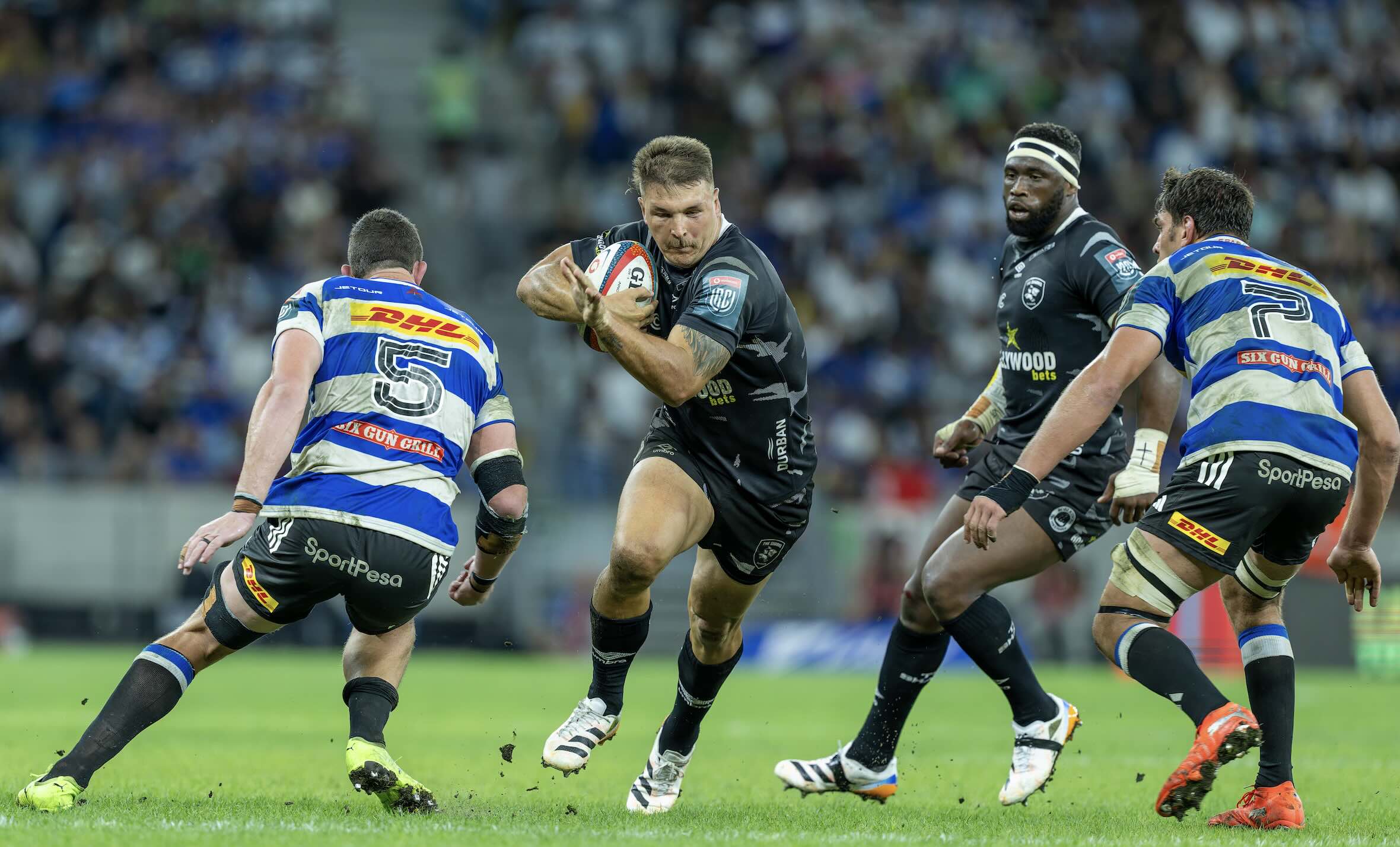
Andre the Giant brought his own storm to Cape Town on the most perfect of January summer evenings. The Stormers mantra is to make Cape Town smile but all they did was make Cape Town cry as Esterhuizen owned the hosts in a complete performance.
Esterhuizen, at inside centre, scored the try-scoring bonus point which finished off the home team in the 72nd minute.
The Sharks beat the Stormers 30–19 at a sold-out DHL Stadium and there was nothing accidental about it. From the first kick-off they were ahead on the scoreboard, ahead in intent and ahead in appetite. They scored inside four minutes and they were never behind.
This was a win built on desire, discipline and leadership and Esterhuizen, the captain at inside centre, embodied all three.
The Stormers imploded from he kick-off when they dropped the ball and within two minutes they’d made three errors, conceded a penalty and within five minutes they trailed by seven points.
It never got better as they shunned any hint of a team effort and individuals chased a glory moment to transform a match they had served to the Sharks on a silver platter.
The Sharks didn’t overplay. They didn’t chase magic. They trusted their systems and trusted each other. Their early try came from pressure and accuracy and not invention. Lineout five metres from the Stormers try line. Five points.
The Stormers had five such opportunities in the 81 minutes, lost three to contesting and two to skew throws.
It was a shocker from the hosts.
Not so Esterhuizen. He was immense. He did not dabble with speculation or theatrics. He was just relentless.
He was strong over the gain line, brutal in the tackle, smart with ball in hand, calm with ball at foot and lethal when striking.
He led and the rest of his players followed.
There was a moment that defined him and the match. Leolin Zas broke clear on the counter. The crowd rose. The Stormers needed something. Esterhuizen hunted him down from inside centre and smashed him into touch. No celebration. Back to work. That was the difference between the teams. The visitors were desperate and the hosts were dazed.
The Sharks won the breakdown battle and they defended with numbers and purpose. They kicked with intent. They didn’t gift territory. When the Stormers made mistakes, the Sharks punished them.
At halftime it was 17–12, and that felt generous to the home side.
The Stormers were frantic. They chased the game instead of managing it. Five line-outs lost in attacking positions. Two yellow cards. Passes forced that didn’t need to be thrown. Kicks played because panic demanded it, not because space existed.
The Sharks stayed composed. They trusted their leaders.
When Ox Nche came on, the tone hardened at the set piece. He dominated his side of the scrum and added another layer of control. The Sharks played like a side that knew exactly what was required and exactly how to deliver it.
The bonus-point try in the final quarter made it 30–12 and ended the contest. The late Stormers score changed nothing.
This wasn’t about league positions. It wasn’t about form tables. It was about attitude. One team arrived ready to fight for every inch. The other looked surprised that a fight had started.
Stormers:
Tries: Willemse 2, Penalty Try
Con: Feinberg-Mngomezulu
Sharks:
Tries: Jenkins, Williams, Buthelezi, Esterhuizen
Cons: Jordan Hendrikse 2
Pens: Jordan Hendrikse 2
Stormers: 15 Warrick Gelant, 14 Suleiman Hartzenberg, 13 Wandisile Simelane, 12 Damian Willemse, 11 Leolin Zas, 10 Sacha Feinberg-Mngomezulu (captain), 9 Cobus Reinach, 8 Marcel Theunissen, 7 Ben-Jason Dixon, 6 Paul de Villiers, 5 JD Schickerling, 4 Connor Evans, 3 Neethling Fouché, 2 André-Hugo Venter, 1 Ntuthuko Mchunu.
Replacements: 16 JJ Kotzé, 17 Vernon Matongo, 18 Sazi Sandi, 19 Salmaan Moerat, 20 Ruben van Heerden, 21 Louw Nel, 22 Imad Khan, 23 Jurie Matthee.
Sharks: 15 Aphelele Fassi, 14 Yaw Penxe, 13 Ethan Hooker, 12 Andre Esterhuizen (captain), 11 Jaco Williams, 10 Jordan Hendrikse, 9 Jaden Hendrikse, 8 Nick Hatton, 7 Manu Tshituka, 6 Phepsi Buthelezi, 5 Emile van Heerden, 4 Jason Jenkins, 3 Vincent Koch, 2 Eduan Swart, 1 Phatu Ganyane.
Replacements: 16 Ethan Bester, 17 Ox Nche, 18 Hanro Jacobs, 19 Vincent Tshituka, 20 Siya Kolisi, 21 Grant Williams, 22 Siya Masuku, 23 Jurenzo Julius.
KEO News Wire
Johan Grobbelaar pure gold in precious Bulls URC win
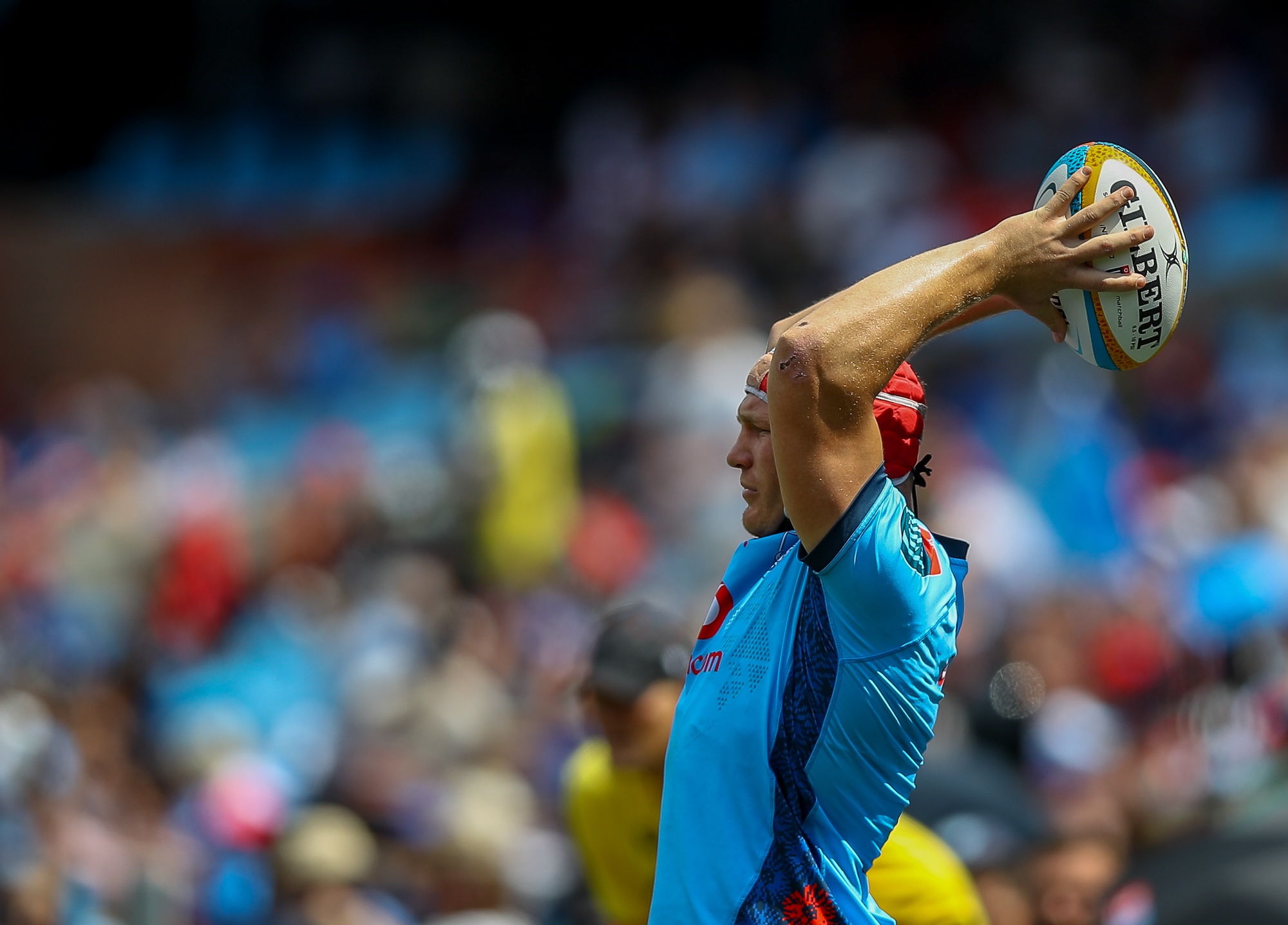
Johan Grobbelaar was pure gold in a precious Bulls URC win. Lions captain Francke Horn was on fire in the 24-all draw against Ospreys.
The Bulls did not win pretty in Edinburgh, but they won properly, with defensive grunt again the take away from a desperate finish. The Lions, having drawn 20-all against Perpignan in the EPCR Challenge Cup a week ago, drew again in Bridgend, Wales.
Handre Pollard’s second conversion proved the decisive scoreline differential for the Bulls and the biggest positive is that Pollard, back at the Bulls from Leicester’s Tigers, started and completed both Bulls matches in against Pau and Edinburgh respectively.
The Bulls are now two from two in all competitions, having snapped a seven-match losing streak. They also ended a four match losing sequence in the URC.
Friday night matches in the United Rugby Championship in the north in late January is not about shape and style but about never, accuracy, honesty in defence, desire to make a tackle and intelligence in worshipping the advantage of field position.
The rain is a leveller and the cold adds to so many of these match-ups being decided by one score.
The Bulls win was a team effort, but hooker Johan Grobberlaar was the stand out in this collective.
Grobberlaar maximised his playing opportunities against Italy and Wales on the Boks northern tour last November, and he is the one Springbok in the Bulls set-up who has played with the authority of a Test player.
Grobbelaar played the full 80 minutes. At hooker. In Edinburgh. And was deservedly named Player of the Match. His numbers tell the story: 43 attacking metres, 15 carries, 13 tackles.
Grobbelaar scored the Bulls’ first try, but his real value was in work rate and accuracy. He carried into traffic. He made his tackles. He hit his throws. There was no fuss.
The Bulls trailed at half-time and never looked comfortable, but they never panicked. They stayed direct, backed their pack and trusted that Edinburgh would blink first. That moment came after the break when the Bulls’ substitutes started making the right kind of noise.
The Bulls Springboks flanker Marco van Staden’s impact was immediate and decisive.
He brought urgency, physicality and intent. His try shifted momentum and his work around the ruck lifted the Bulls when the game was still in the balance. Van Staden doesn’t need long minutes to influence matches. He needs moments, and he made them count.
WATCH: KEO & ZELS ON THE BULLS & LIONS
This win matters for the Bulls.
The URC table is unforgiving and away wins are gold. The Bulls needed one.
The Lions didn’t get a win, but they didn’t lose either – and they took three league points from Bridgend.
A draw away to Ospreys keeps the Lions in the fight and showed again that this group competes, even when the margins are thin. They were good in patches, vulnerable in others, but never folded.
Captain Francke Horn led from the front. He scored early, worked tirelessly and set the tone defensively. On a wet night when control was hard to come by, Horn provided it through effort and presence.
The Lions remain vulnerable in their inability to close matches they should be winning, but they have shown character and desire to stay in the fight until the final whistle. They scrap for everything, and that is something that can’t be coached.
SA Rugby Mag match reviews on Bulls and Lions
All the latest from the URC’s ROUND 10
Bulls 19 Edinburg 17
Ospreys 24 Lions 24
KEO News Wire
Why the Stormers will beat the Sharks in Cape Town
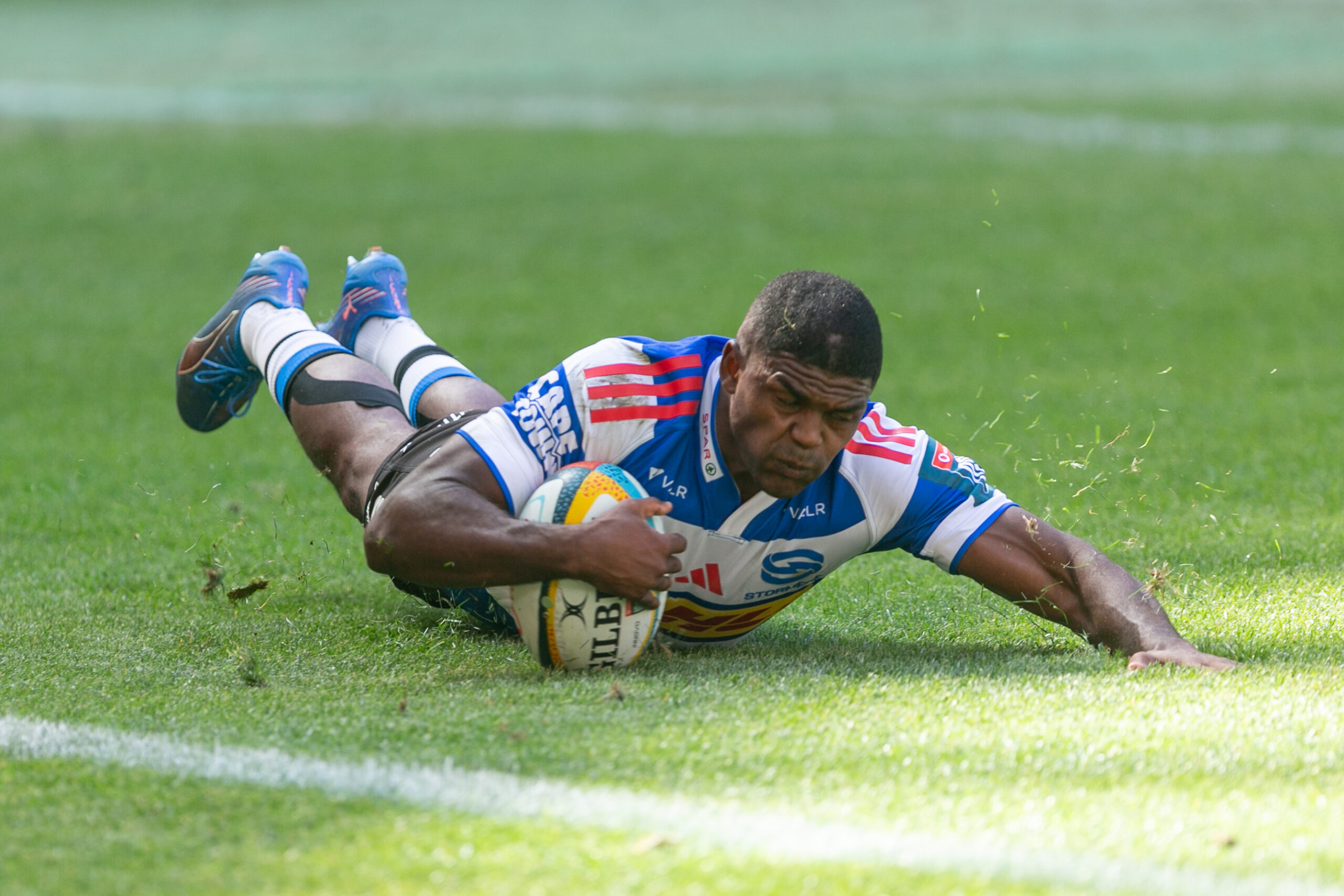
The Stormers will beat the Sharks because they are clearer in what they want to do, more accurate in how they do it, and far more reliable at home than the Sharks are on the road.
The DHL Stadium will be a sell-out, with 54 000 in attendance.
The Stormers, unbeaten in eight URC matches this season, will give the home support a ninth league win.
This United Rugby Championship derby won’t be decided by Springbok reputations or squad depth. It will be decided by decision-making, defensive pressure and who controls the last 20 minutes. In all three areas, the Stormers have the edge.
The Stormers’ game is built on tempo and continuity. At the DHL Stadium they play flatter, faster and with more intent than most teams in the URC. They don’t chase collisions for the sake of it. They move defenders, stretch big bodies and force repeat defensive efforts.
That matters against the Sharks.
The Sharks are at their best when games are slow, structured and physical. Give them front-foot ball and time at the breakdown and they can overwhelm sides. Take that away, rush their decision-makers and make them defend laterally, and their power game loses impact.
The Stormers’ defensive system at home is aggressive and organised. Line speed is consistent, tackles are completed, and breakdown contests are selective rather than reckless. It’s a system designed to deny momentum, not win highlight turnovers.
Against the Sharks, denying momentum is everything.
The Stormers also manage pressure better late in games. They don’t panic when the scoreboard is tight. They stay in the contest, trust territory and back their conditioning. The Sharks, by contrast, have too often drifted in tight finishes, trying to force moments rather than build them.
If the Stormers control field position and stay disciplined, the Sharks will be forced to chase the game – and that is when they will be in trouble.
KEO News Wire
Where SA rates in the Investec Champions Cup stats

Sacha Feinberg-Mngomezulu and Sebastian de Klerk feature in the top five of individual categories, but most facets of the Investec Champions Cup four-round Pool phase are dominated by defending champions Bordeaux and high-flying Glasgow Warriors.
Surprisingly, Stormers loose-forward Paul de Villiers, who won two Investec Champions Cup Player of the Match awards in three matches, did not make the final 10.
Clinton Swart, on loan to the Stormers from South Africa’s Pumas, kicked four penalties agains Bayonne, which was the only full match he played. It was also the only match in which he kicked, yet his four penalties ranked in the top five of penalties kicked across all teams.
This illustrates the premium put on scoring tries, with Bordeaux’s 27 tries the best in the competition.
HOW THE STORMERS CAN HOST AN INVESTEC CHAMPIONS CUP QUARTER-FINAL
Feinberg-Mngomezulu’s eight line breaks in two matches is the fifth most, while De Klerk’s 279 attack metres is ranked fourth.
South African-born Glasgow captain Kyle Steyn is in the top three for defenders beaten and South Africa’s Ernst van Rhyn made the most tackles with 66.
Bordeaux and Glasgow were the only two teams in 24 who completed their Pool campaign unbeaten. The Stormers were South Africa’s best with three wins in four matches, including an away win in France against Bayonne.
The Stormers, as a collective, rank in the top five for clean breaks and turnovers won.
The Bulls scrum success rate of 97 % was joint fourth.
INVESTEC CHAMPIONS CUP – ALL THE LATEST NEWS
Top performers (pool stage)
Points: Thomas Ramos (Toulouse) – 53
Carries: Jack Dempsey (Glasgow Warriors) – 58
Metres: Caden Murley (Harlequins) – 344
Defenders beaten: Fletcher Anderson (Scarlets) – 25
Offloads: Tom Farrell (Munster) – 10
Tackles: Ernst van Rhyn (Sale Sharks) – 66
ALSO: Champions Cup Team of the Week (Round 4)
Key stats (pool stage)
– Louis Bielle-Biarrey (Bordeaux Bègles) finished the pool stage as the competition’s leading try scorer with six.
– Freddie Douglas (Edinburgh) topped the turnovers chart, winning a total of 12 at the breakdown.
– Clinton Swart (Stormers) featured among the top five penalty kickers, slotting four penalties in the two matches he played
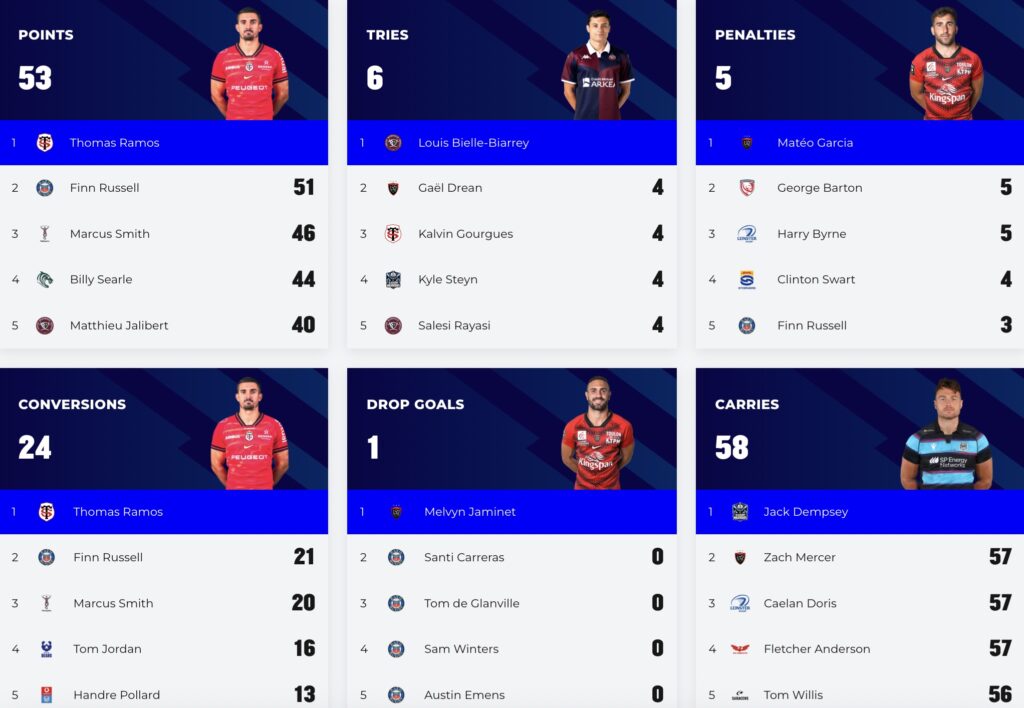
Screenshot
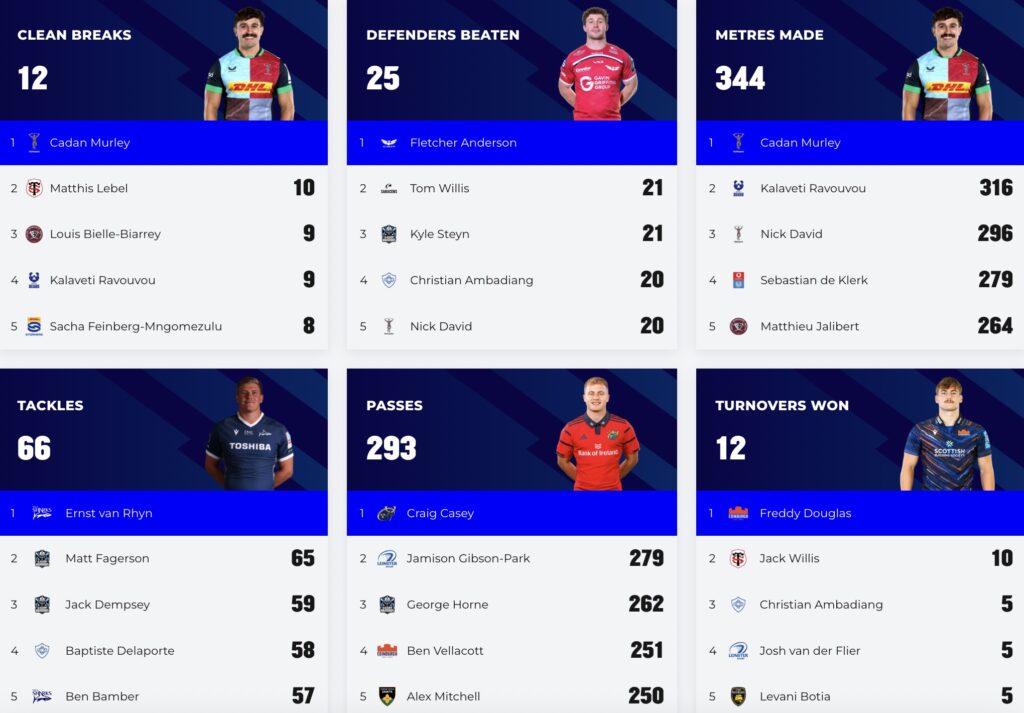
Screenshot
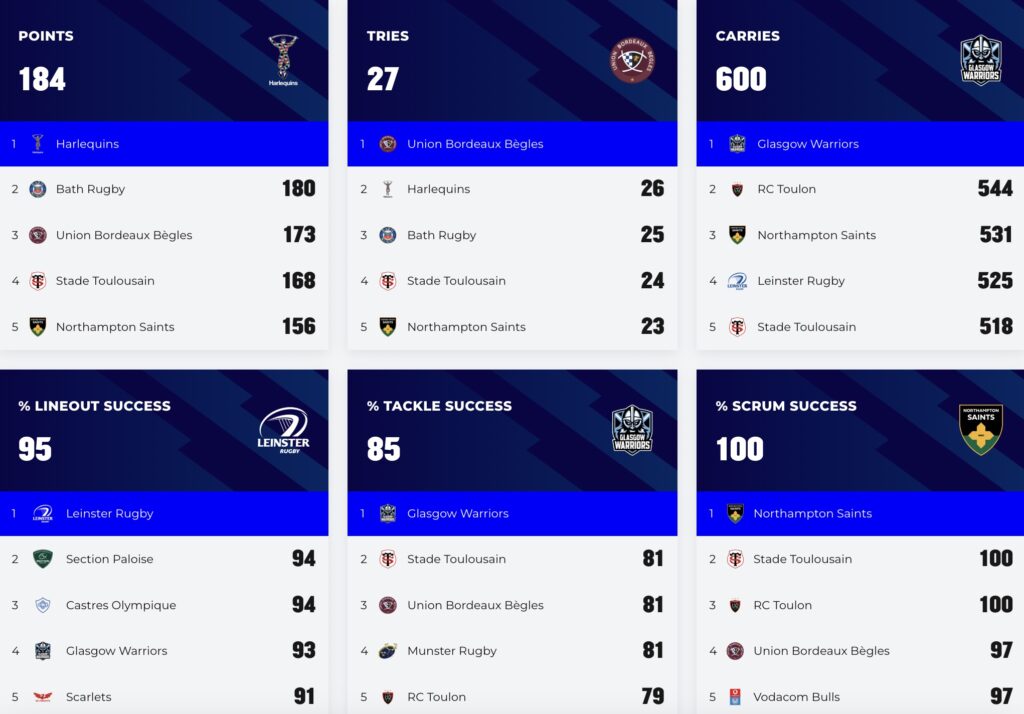
Screenshot
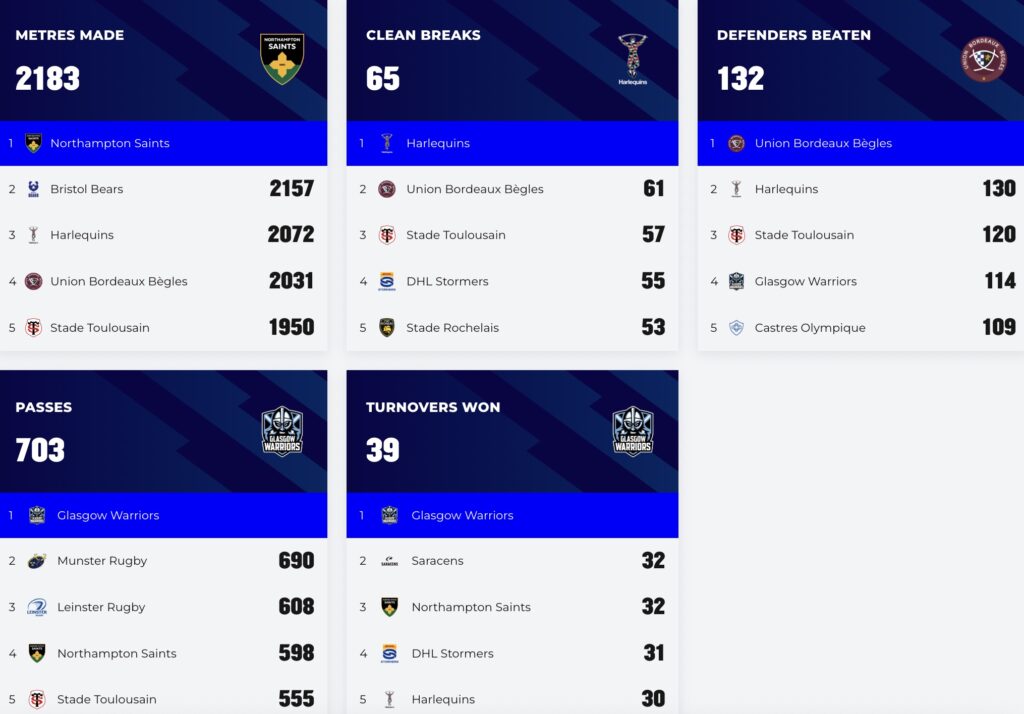
KEO News Wire
Jooste’s precision and pace is the STECO Power Play

Cheswill Jooste’s stunning counter-attack try for the Bulls against Pau, is the Keo & Zels STECO Power Play of the Investec Champions Cup Round 4.
Jooste’s try did not make it into the official weekend Investec Tries of the Week, but according to Keo & Zels, on their weekly rugby podcast, it is not a matter of ‘if’ Jooste plays for the Springboks, but ‘when’ he plays for the Boks.
Jooste was electric for the Junior Springboks a year ago when they beat New Zealand in the final to win the under 20 World Championship title.
He quickly made his introduction to the Bulls senior squad and in Pau, he announced himself to the global rugby community with a try that showcased his understanding of space, his appreciation of his own pace, and his ability to manipulate putting boot to ball.
His kick ahead, after Sebastian de Klerk’s break and offload, was no speculator. It was a kick, so structured and accurate in how he kicked it, and the execution was worth a golden star as he accelerated, slowed and picked the bounce of the ball perfectly, and then put on the after burners to score.
It was everything STECO tells you about their very best products. It just works!
STECO’S MENU: POWER & PRECISION & SUSTAINABILITY
The Bulls won 26-24, with Jooste’s try, the third of the Bulls’ four, changing the course of the match and also the Bulls season.
The Bulls, thanks to the win, broke a seven match losing streak but crucially got that one win that proved enough to get them into the Investec Champions Cup last 16. They will play Glasgow Warriors in the last 16; a team they lost to in the 2023/24 URC final in Pretoria.
It is also a team they have previously beaten.
ALL PLAYER AND TEAMS STATS FROM THE INVESTEC CHAMPIONS CUP
The Investec Champions Cup Round 4 produced sensational tries across the 12 matches, with Toulouse, 77-7 winners against Sale, the leaders in excellence. Thomas Ramos, as he has done all competition, was electric. Antoine DuPont was brilliant and Toulouse had several candidates for the best five pointer of the round.
https://www.sarugbymag.co.za/watch-champions-cup-top-tries-round-4
The Sharks scored some stunning tries in the 50-12 demolition of a second-string Clermont in Durban and Evan Roos produced a pearler for the Stormers against the Leicester Tigers in the home team’s 39-26 win in Cape Town.
Cheswill Jooste’s brilliant try against Pau is our #Steco #PowerPlay of the week! pic.twitter.com/tkIQRgW7uP
SA Rugby magazine (@SARugbymag) January 20, 2026
KEO News Wire
Stormers can play Bulls in Cape Town in Investec Champions Cup last 8

The Stormers and Bulls will both travel for the last 16 play-offs of the Investec Champions Cup, while the Sharks will compete in the EPCR Challenge Cup play-offs, writes Mark Keohane. However, away wins for the Stormers and Bulls would see them meet in Cape Town in the quarter-final.
The last 16 is only played in the first week of April, nearly 10 weeks from now, so plenty will change with each of the qualified teams, given their demanding domestic competitions and the added toil of the Six Nations in February and March.
The Stormers, ranked 10th in the qualification process despite winning three of their four matches, will play Toulon at the Stade Mayol. Toulon, who finished second in their Pool, ranked seventh out of the 16 qualified teams.
The Bulls, who sneaked into the last 16, courtesy of a solitary victory against Pau, are ranked 15th and they travel to the Glasgow, who won all four matches to be ranked second behind defending champions Bordeaux, who ranked first with four wins from four.
Bordeaux beat the Bulls and Bristol away and hammered last season’s finalists, Northampton Saints at home.
The defending champions will play 16th place Leicester Tigers, while French giants Toulouse host Bristol and, if successful, they will travel to Bordeaux, assuming the champions beat the Tigers.
The Investec Champions Cup 24 teams featured eight from the Top 14, eight from the Prem and eight from the URC. The Prem has seven teams in the last 16, with Gloucester the only English club to miss out, the URC has five teams and France’s Top 14 has four survivors from the original eight.
In the last 16, there will be four cross border clashes, two all-English Prem-type showdowns and two URC match-ups.
From a South African perspective, should the Stormers and Bulls win away from home, then the Stormers would host the Bulls in the quarter-finals in Cape Town. The winner would then in all likelihood travel to Dublin to play Leinster in a semi-final, with the Irish hosting Edinburgh in the last 16 and, if successful, the winner of Harlequins v Sale, with the winner of that match decided at the Stoop in South West London.
Bath, having topped their pool with three wins from four, host English rivals Saracens, who won both their home matches, but lost on the road to the Sharks in Durban and Franco Smith’s Warriors in Glasgow.
There are two South African teams in the last 16 and six South African coaches, with Leinster, Glasgow, Edinburgh and Bath all having South African coaches in charge.
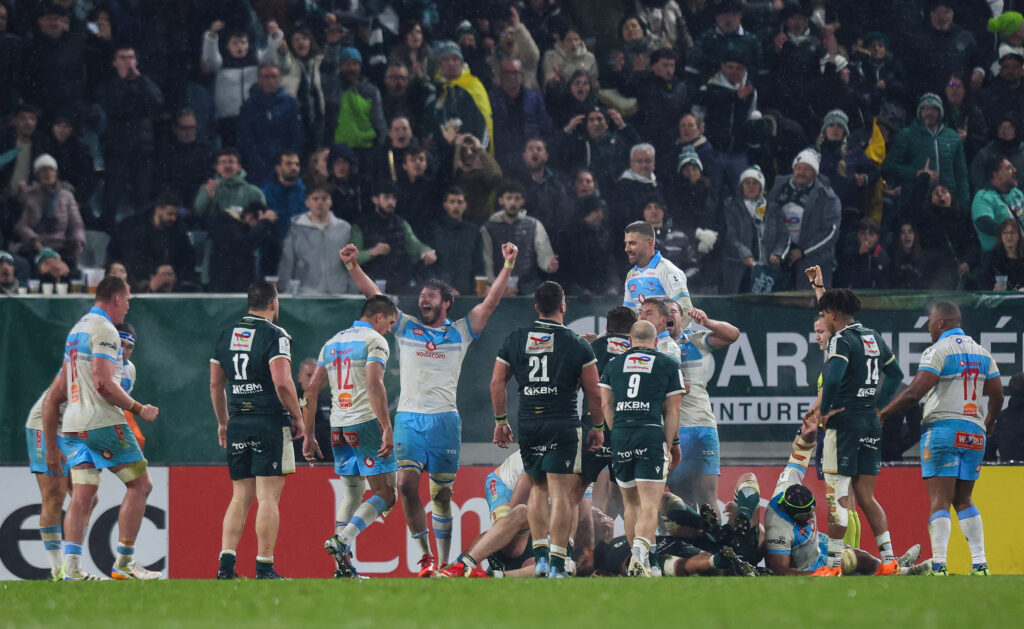
©INPHO/Ryan Byrne
The Stormers finished their qualification with a try-scoring bonus point win against Leicester’s Tigers in Cape Town. They won 39-26.
The Sharks hammered Clermont 50-12 in Durban, but the two wins from four matches was not enough to qualify and they finished fifth in a tightly contested pool. They drop to the EPCR Challenge Cup, which they won two years ago. They will play Cardiff in Cardiff in the last 16.
EVERY PLAYER AND TEAM STAT FROM THE INVESTEC CHAMPIONS CUP ROUND 4
SA RUGBY MAG WEEKEND WRAP OF STORMERS, BULLS, SHARKS, LION & CHEETAHS
BULLS MAKE PLAY-OFFS DESPITE WINNING JUST ONE POOL MATCH
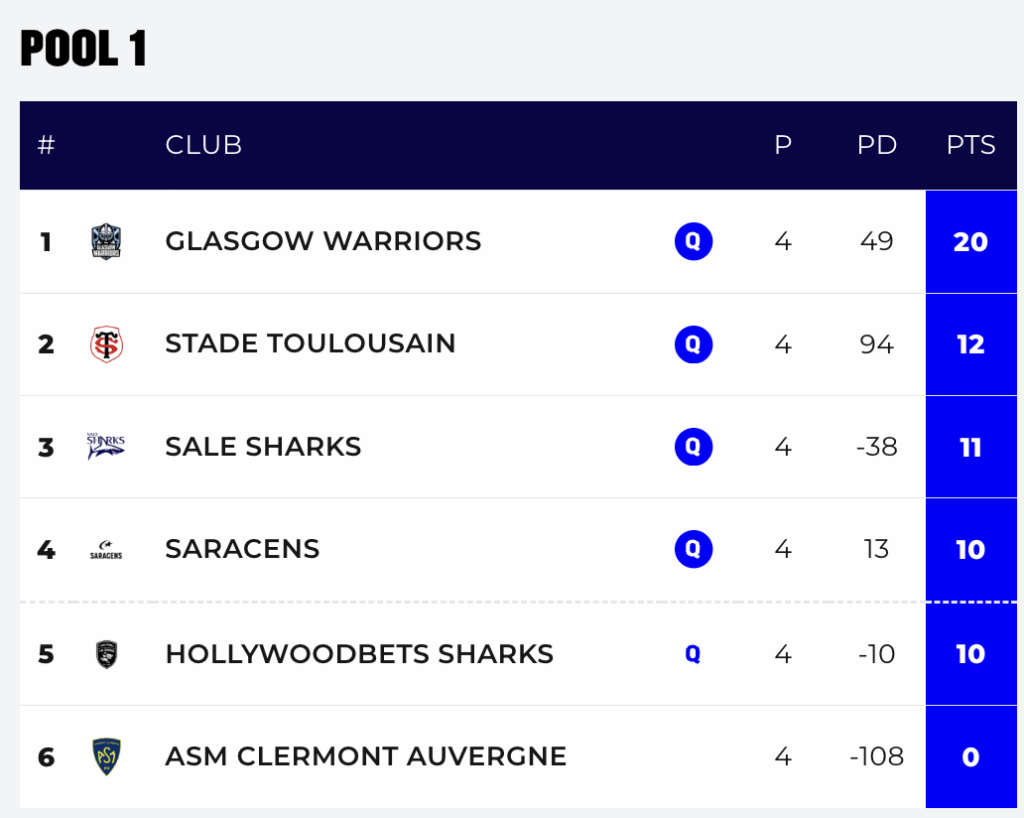
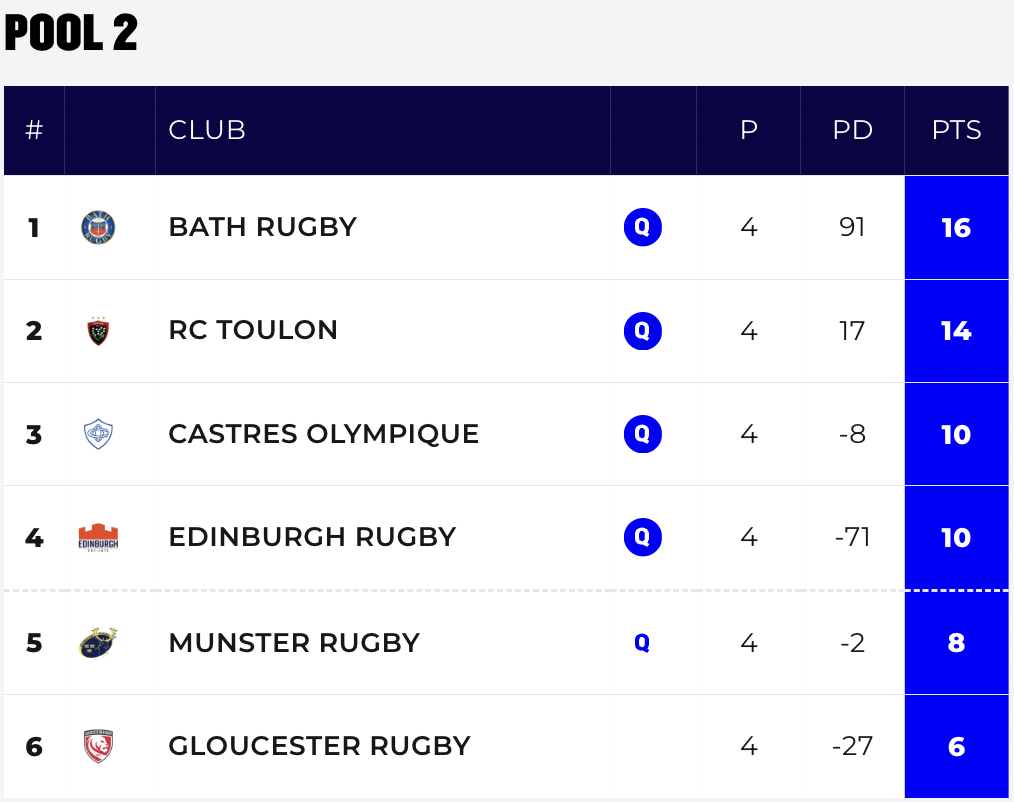
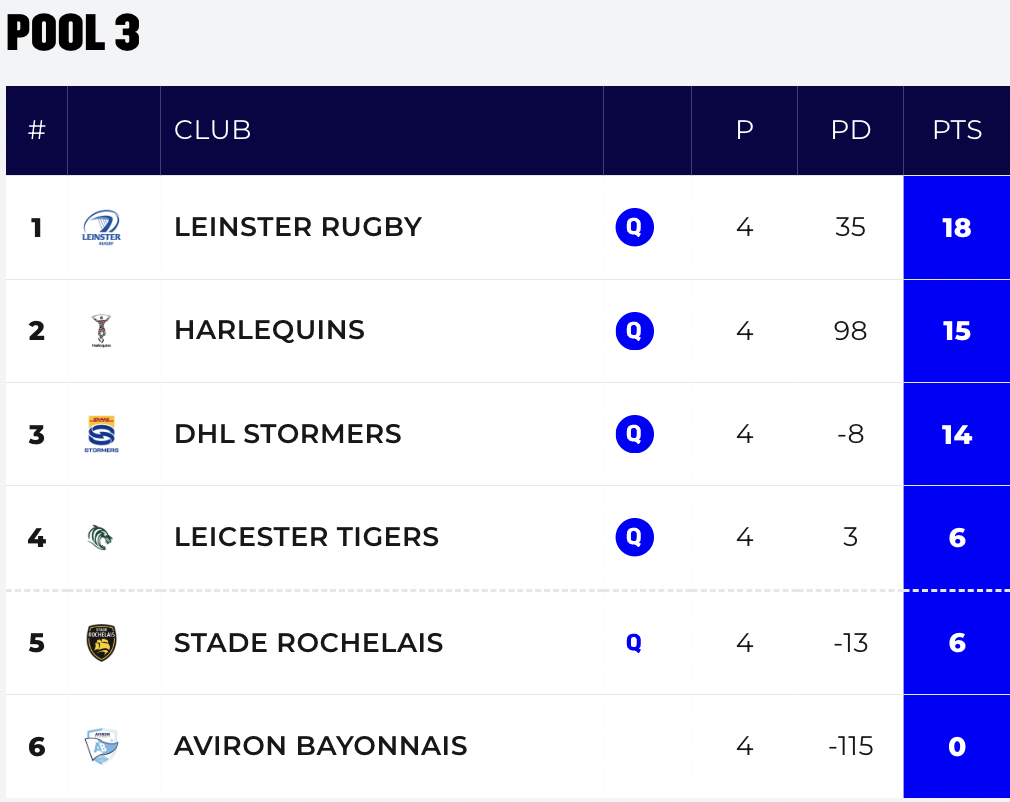
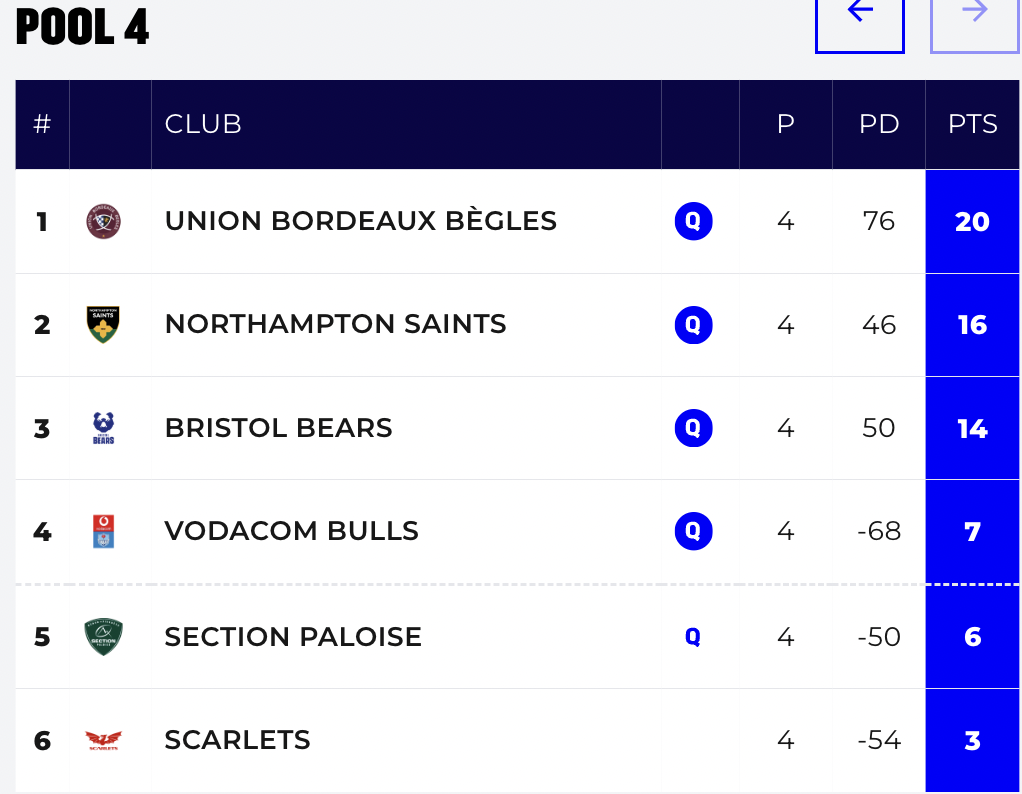

KEO News Wire
Stormers stutter into last 16 Investec Champions Cup play-offs
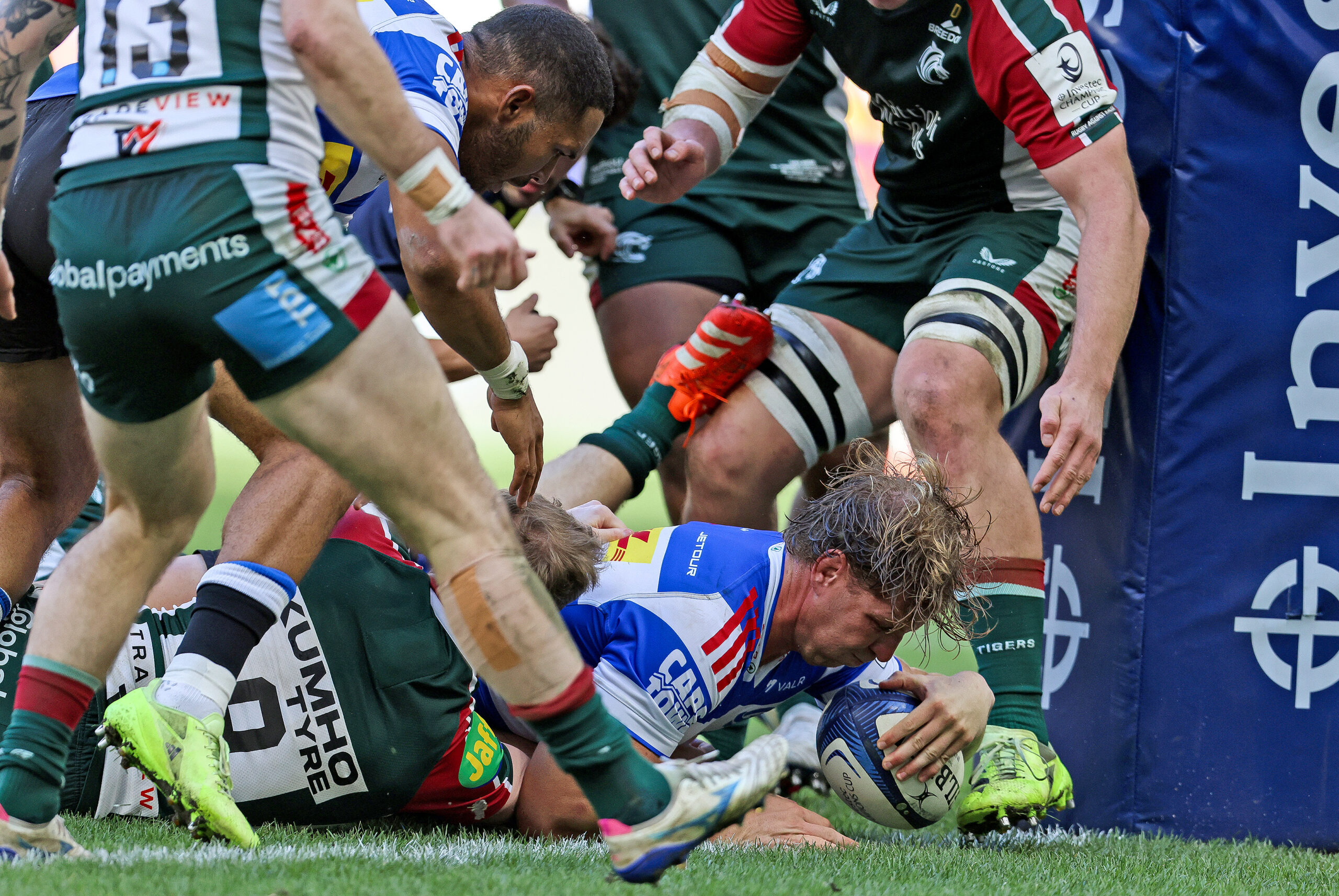
The Stormers have qualified for the Investec Champions Cup last 16, but what a struggle it was at the DHL Stadium in Cape Town, writes Mark Keohane.
The Stormers won 39-26, having led 15-14 at halftime.
They scored five tries to four and finished the match through an Imad Khan try and Sacha Feinberg-Mngomezulu conversion.
It may read well, in terms of scoreline, but the performance read nothing like the scoreline.
I had the Stormers to win on my Africa Picks 38-26, and they won 39-26. I expected a tussle but I did not expect the Stormers to be as abject, inept, passive and loose as they were for the first 70 minutes of the match.
It took Feinberg-Mngomezulu getting yellow-carded and the sudden downpour of rain in the final 10 minutes to galvanise the Stormers and showcase the mongrel one has come to expect from this team.
The Stormers are a good side, and they are at their most dangerous when they play with more balance and composure and at a tempo that fluctuates. It is when they disregard all on-field feeling for the moment and just play with all-out attack, that they are more a danger to themselves than the opposition.
The Stormers have star quality in individuals and they have the big moment play-makers, but they are such a frustrating team to watch when they deliver the kind of opening hour that they did at the DHL Stadium.
A crowd of 25 000 paid to watch the Stormers and they left cheerful with the win the prospect of the Stormers hosting a last 16 play-off in April, but they would also have left with more hope than conviction that the Stormers can advance to the final eight or last four of the competition.
This was a performance characterised by inaccuracy in execution and by the predictability of their own supposed unpredictability.
There is no crime in slowing the tempo down on occasions, taking three points, or playing for field position.
It is not boring but intelligent. Equally not every pass has to be the miracle ball.
It was a case of job done, by way of five points, but it was too messy of a job to give comfort to the coaches or instil uneasiness in whoever the Stormers face in the last 16.
Paul de Villers won a third Player of the Match award, Khan made an impact at scrum half in the last 20 minutes, and centre Jonathan Roche was busy on attack and at the breakdown.
JD Schickerling scored a popular try and one for the archives, but the big play moments were secondary to too many minutes of the mundane and the ordinary.
This competition espouses out of the ordinary but at in Cape Town there was just too much ordinary for two clubs of such stature.
If La Rochelle wins against Harlequins on Sunday, then the Stormers will finish second and host a last 16. If Harlequins win, then the Stormers will be on the road, as Leinster and Harlequins would take the top two places.
*The Sharks hammered a second rate Clermont 50-12 in Durban, which was not enough to get them to the last 16 of the Champions Cup. The Sharks won two from four matches, but such was the competitive nature of the Pool, that Toulouse, with two wins from four, would finished ahead of them. A fifth place finish relegates the Sharks to the EPCR Challenge Cup, which they won two seasons ago.
*The Bulls will know their fate on Sunday, but they will be favourites to advance to the last 16, despite getting just one win in four in the Pool stages. The Scarlets must beat Northampton Saints with a try-scoring bonus point away from home to deny the Bulls.
ALL THE LATEST ROUND 4 PLAYER AND TEAM STATS FOR THE INVESTEC CHAMPIONS CUP













fdertol mrtokev
8th February 2026 at 9:52 pm
I love your writing style genuinely loving this site.
rajapola
15th February 2026 at 10:37 pm
Hiya, I’m really glad I’ve found this information. Today bloggers publish just about gossips and net and this is actually frustrating. A good blog with interesting content, this is what I need. Thank you for keeping this website, I’ll be visiting it. Do you do newsletters? Can not find it.